DANCING QUEEN
On board Crescent Custom Yachts' 50m Danzante Bay
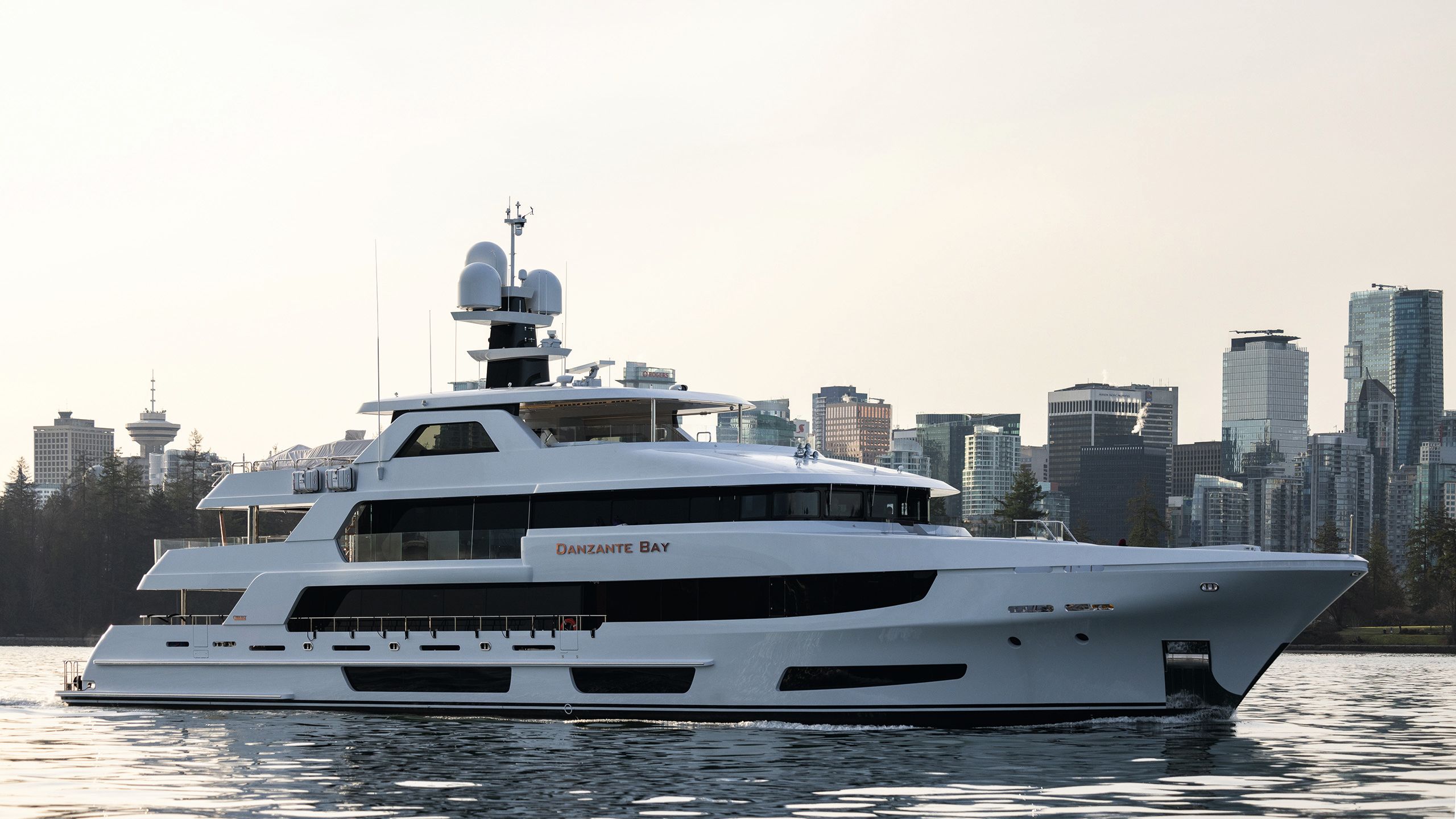
Named for a resort area in Mexico, the new Danzante Bay may have been born in North America but it blends the best of international yacht design, says Cecile Gauert
DOLF VERMEULEN
Building a flagship for the Canadian yachting industry was not really what the CEO of Crescent Custom Yachts had in mind. When he got into the family business and decided to revive the brand his grandfather Jack had created, Tim Charles did not foresee something like the 50-metre Danzante Bay, a yacht with much of the glitz and luxury seen on vessels born thousands of miles away, in the superyacht building powerhouses of Italy or the Netherlands.
As he drives a white electric Hummer through the streets of Vancouver in August 2023, on his way to the yard in Richmond, he talks about family, his responsibility as an employer and fun on the water. “I did not set out to build the largest yacht in Canada,” he says, “I like to be a little under the radar. We’re just slowly building ourselves up.”
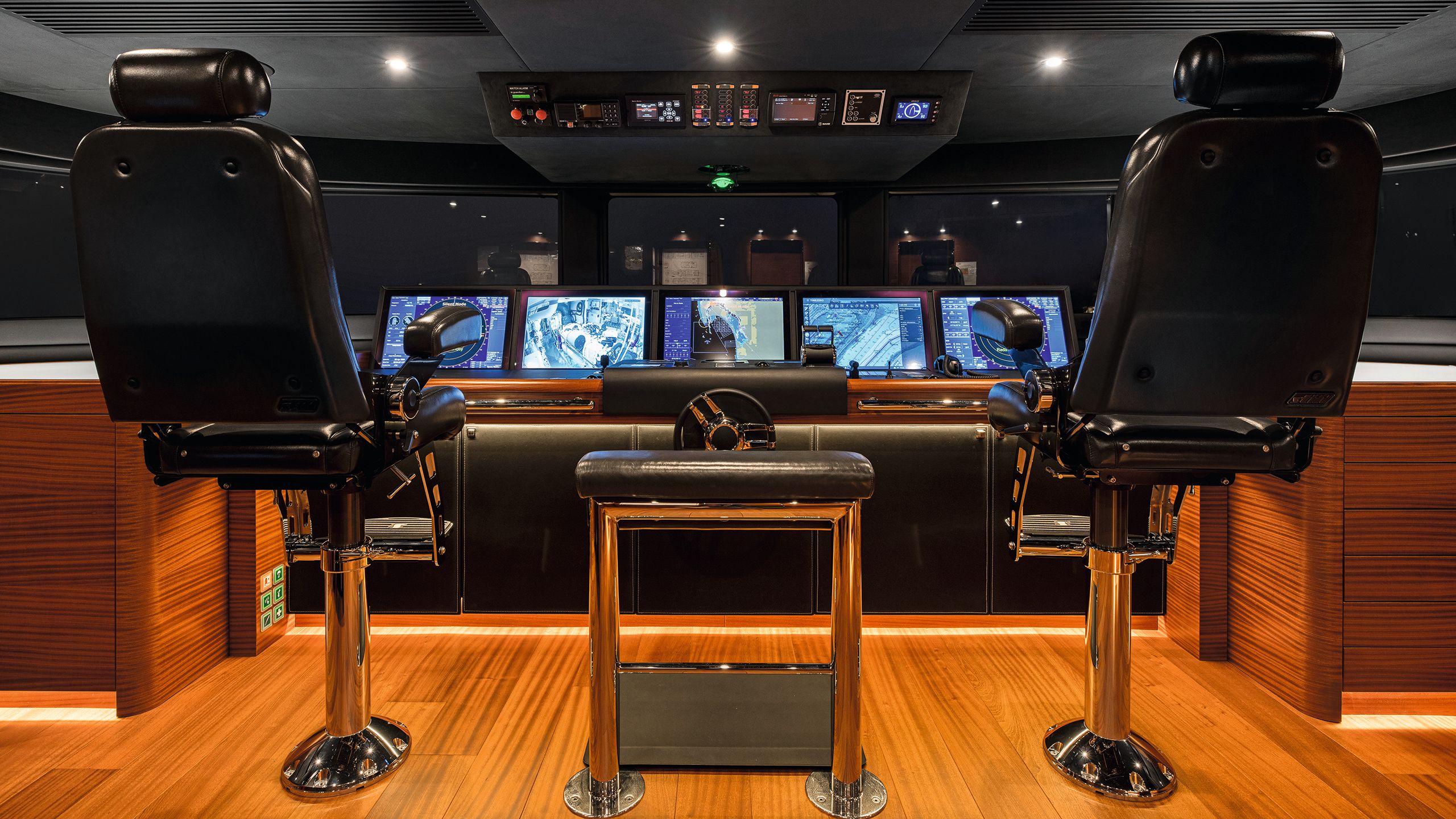
DOLF VERMEULENThe yacht’s Hatteland monitors display information drawn from the complete Telemar navigation package, Sperry radars and Sailor system
DOLF VERMEULENThe yacht’s Hatteland monitors display information drawn from the complete Telemar navigation package, Sperry radars and Sailor system
At the yard, which is very much a working yard — no glitz, no art gallery or towering offices here — Danzante Bay, awaiting further sea trials, also seems to shy away from attention. A floating dock high against the hull — to facilitate access for the nonstop flow of workers — partly conceals the hull and her whisper-grey colour is muted against a cloudy sky.
Look at her on the water, however, and you’ll get a sense of her scale, her proud bow, and beautiful lines by Gregory C Marshall Naval Architect, complete with ample glass and what the design firm’s CEO, Greg Marshall, calls “Juliet balconies.”
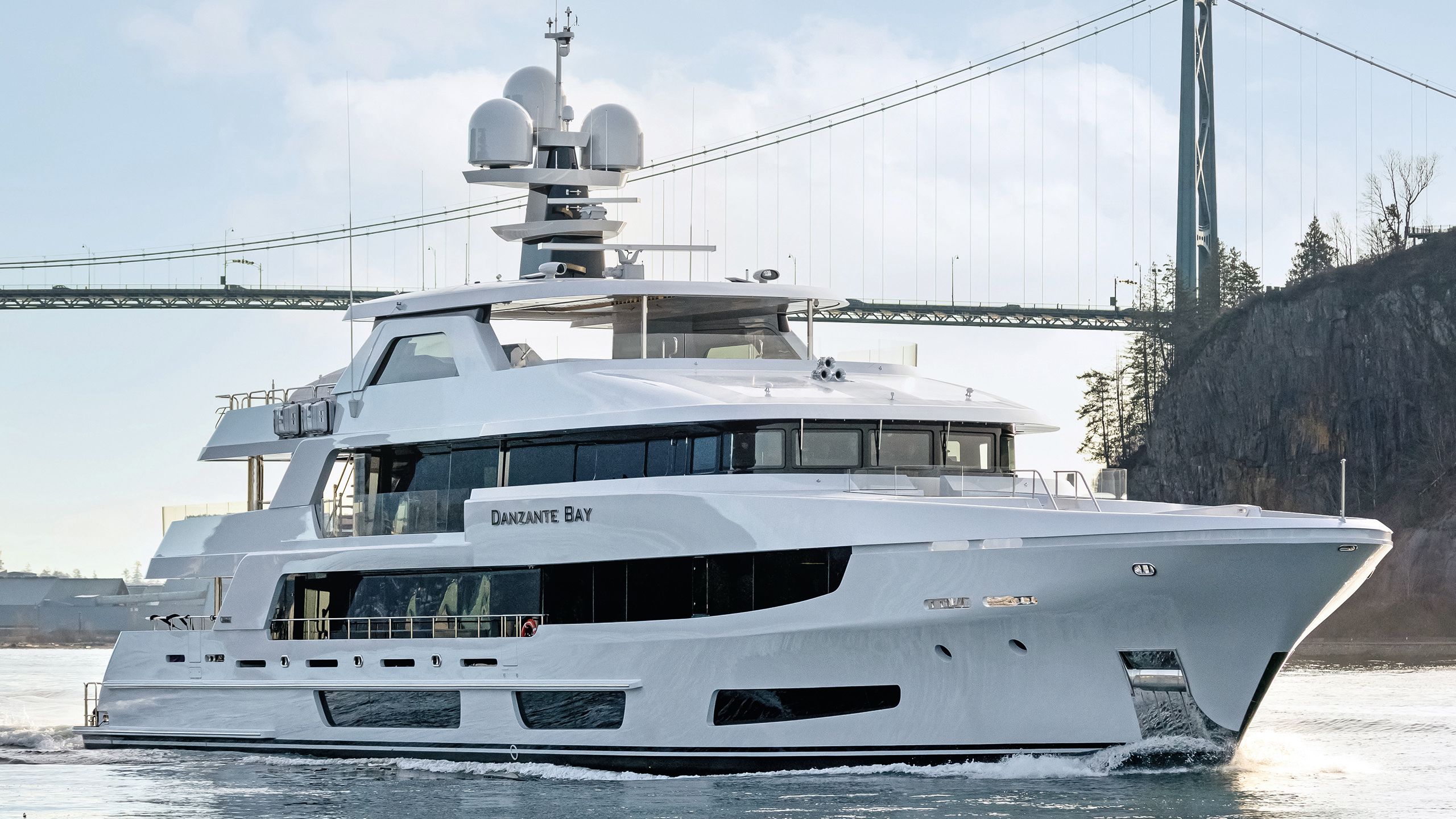

DOLF VERMEULENOpening up the views are what designer Gregory Marshall calls “Juliet balconies"
DOLF VERMEULENOpening up the views are what designer Gregory Marshall calls “Juliet balconies"
She is far removed from her origins. As one of American shipyard Christensen’s 50-metre models, she was engineered and started in Vancouver, Washington, as hull No 42, but construction stopped after the hull and part of the superstructure were completed in 2014. She presented an opportunity for the owner of Danzante Bay, an American developer who has had boats for many years.
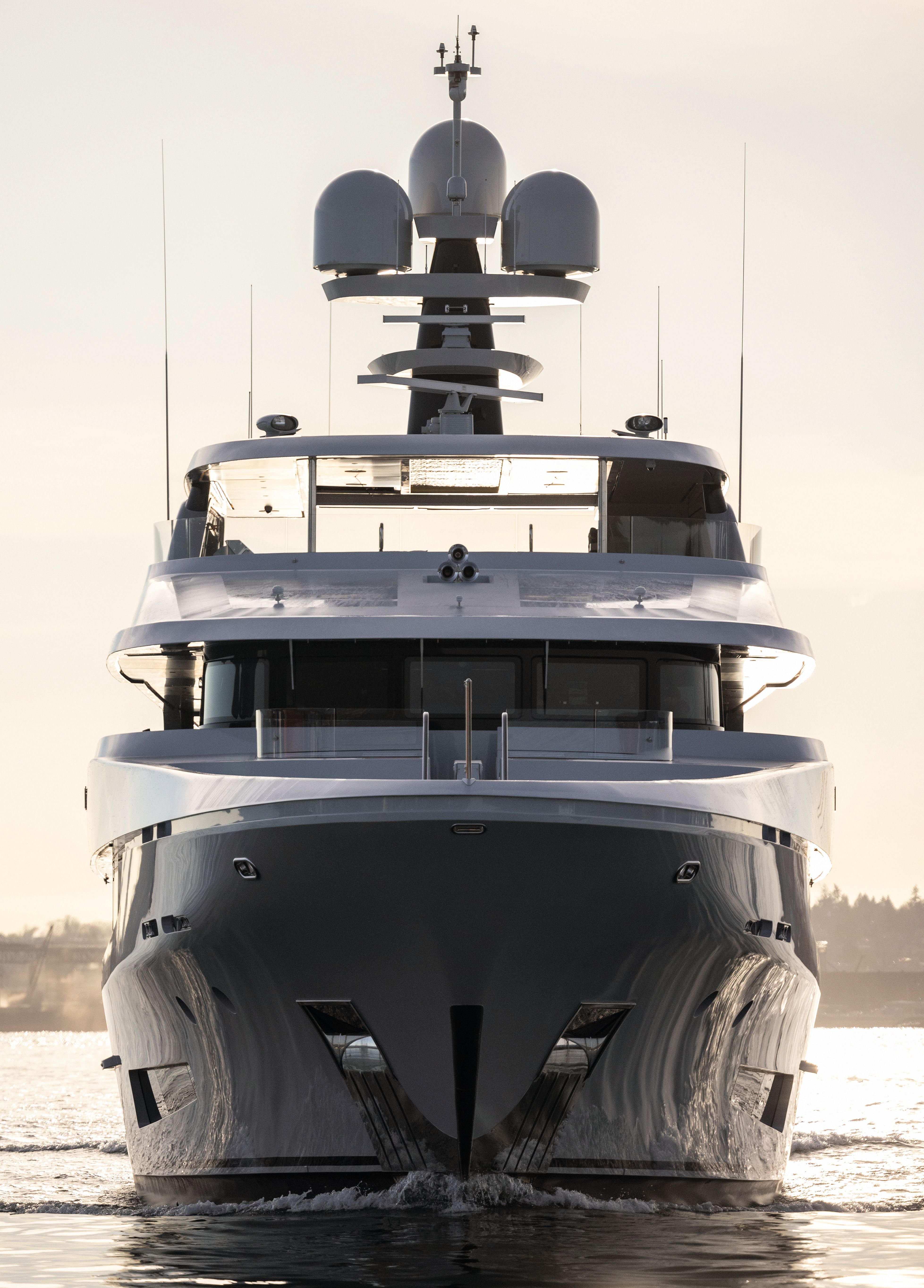
DOLF VERMEULENOpening up the views are what designer Gregory Marshall calls “Juliet balconies"
DOLF VERMEULENOpening up the views are what designer Gregory Marshall calls “Juliet balconies"
Christensen was winding down after a successful run producing high-quality yachts built in fibreglass. There was talk then of moving the facility to Tennessee and the yard’s new owner was looking to liquidate all assets held in Washington State after selling the shipyard.
It was not a happy story for the Pacific Northwest yachting industry, but at least something good came out of it. “I have nothing but good things to say about Christensen,” Charles says. “And we were able to make lemonade with lemons.”
She is far removed from her origins. As one of American shipyard Christensen’s 50-meter models, she was engineered and started in Vancouver, Washington, as hull No 42, but construction stopped after the hull and part of the superstructure were completed in 2014. She presented an opportunity for the owner of Danzante Bay, an American developer who has had boats for many years.
Christensen was winding down after a successful run producing high-quality yachts built in fibreglass. There was talk then of moving the facility to Tennessee and the yard’s new owner was looking to liquidate all assets held in Washington State after selling the shipyard.
It was not a happy story for the Pacific Northwest yachting industry, but at least something good came out of it. “I have nothing but good things to say about Christensen,” Charles says. “And we were able to make lemonade with lemons.”
“This is a vacation home where you have a different view when you wake up in the morning. I could not buy a home in one place and go back year after year. I’d get bored”
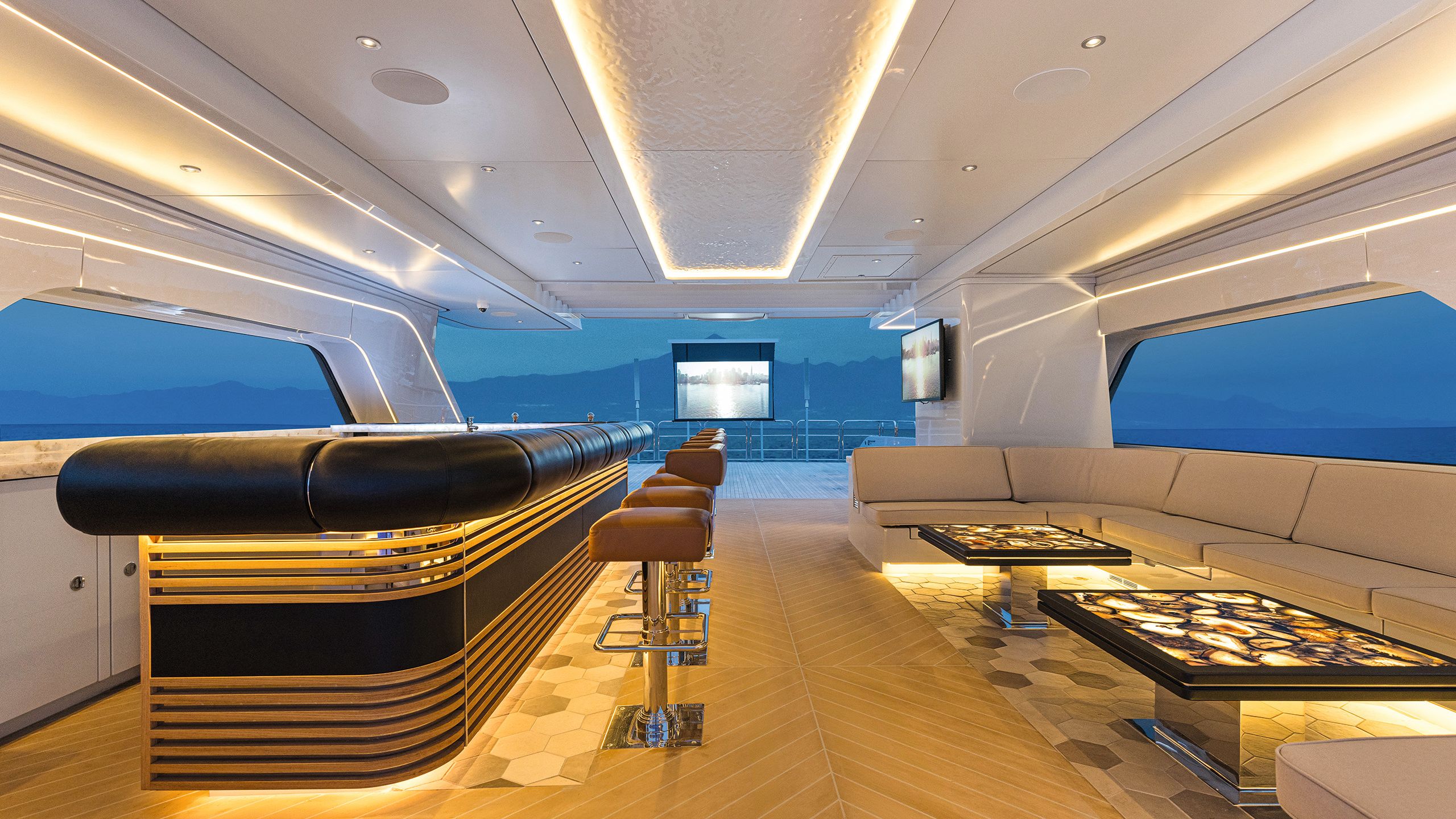
Around the time Christensen ceased operating, the owner, who had been enjoying the 33.8-metre Horizon motor yacht El Mirar II for more than a decade, was looking to go bigger. Ever since his first boat, a Knight & Carver that he kept for many years, he’s been convinced there is nothing better than a private yacht to enjoy life in downtime.
“This is a vacation home where you have a different view when you wake up in the morning. I could not buy a vacation home in one place and go back year after year. I’d get bored after a while, and I just find that yacht ownership really fits my personality well; it’s enjoyable and it’s adventurous,” he says.
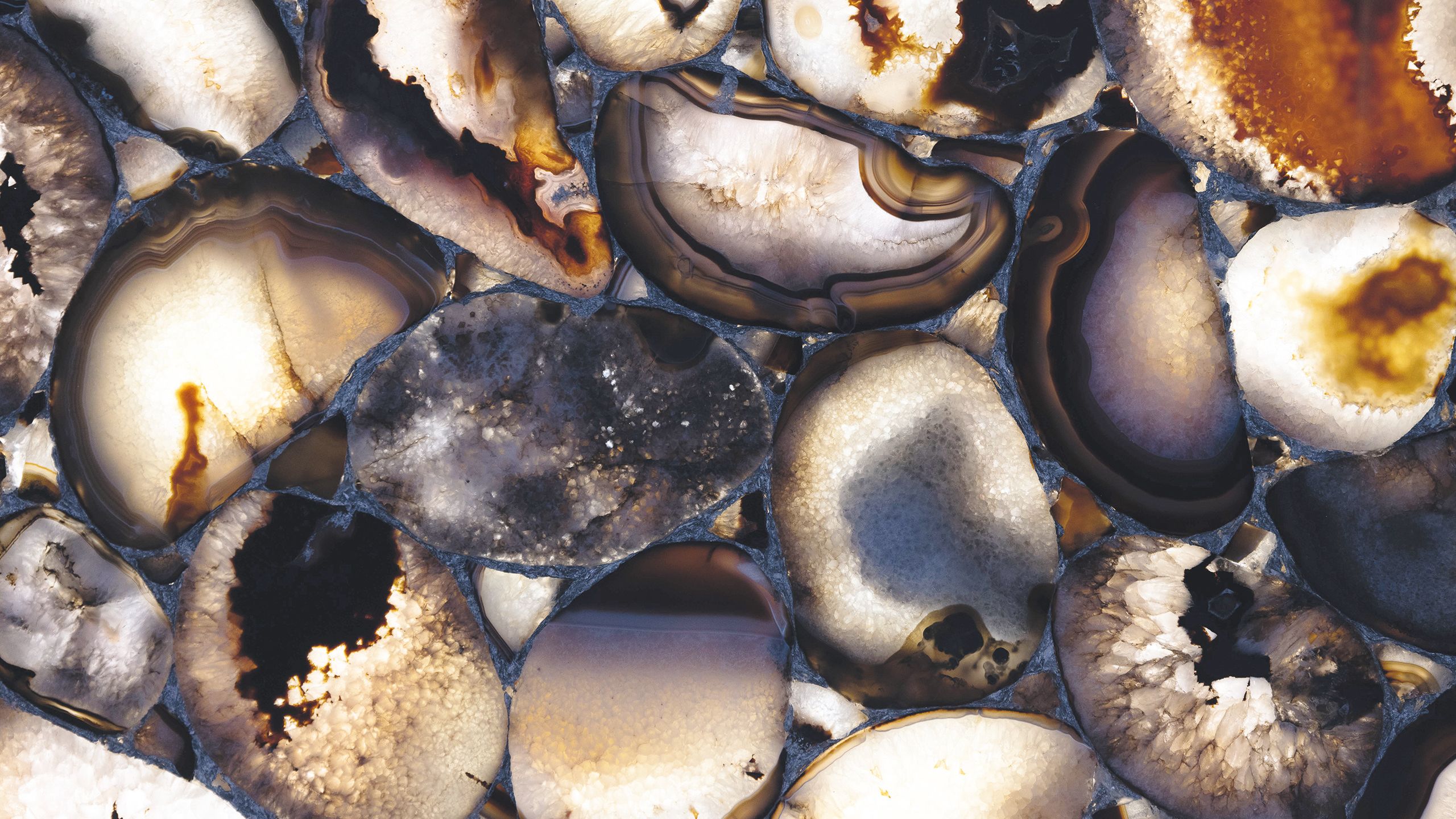
He had been shopping for a while but came up short of finding the perfect new yacht to explore the world further off the coast of North America. “I just could not find anything with the interior that I liked,” he says.
Just then a broker told him about an opportunity to make a good deal on the partially built Christensen. “I flew up to Portland and toured the facility. There was just the shell and I looked at the plans that they had for it, and I said, man, that’s perfect.”
When it came to the shipyard to finish it, the decision was somewhat easy. He’d seen a few Crescent yachts on the West Coast of the US over the years and he was confident in the artisanship you can find in Canada.
“My mentor in the resort business was Canadian, from West Vancouver. He was a great builder and a great businessman and taught me a lot of what I know today and that I’ve been successful with. I’ve worked with Canadians for a long time,” the owner says. “Also with the exchange rate, there was a [financial] benefit to working in Canada as well.”
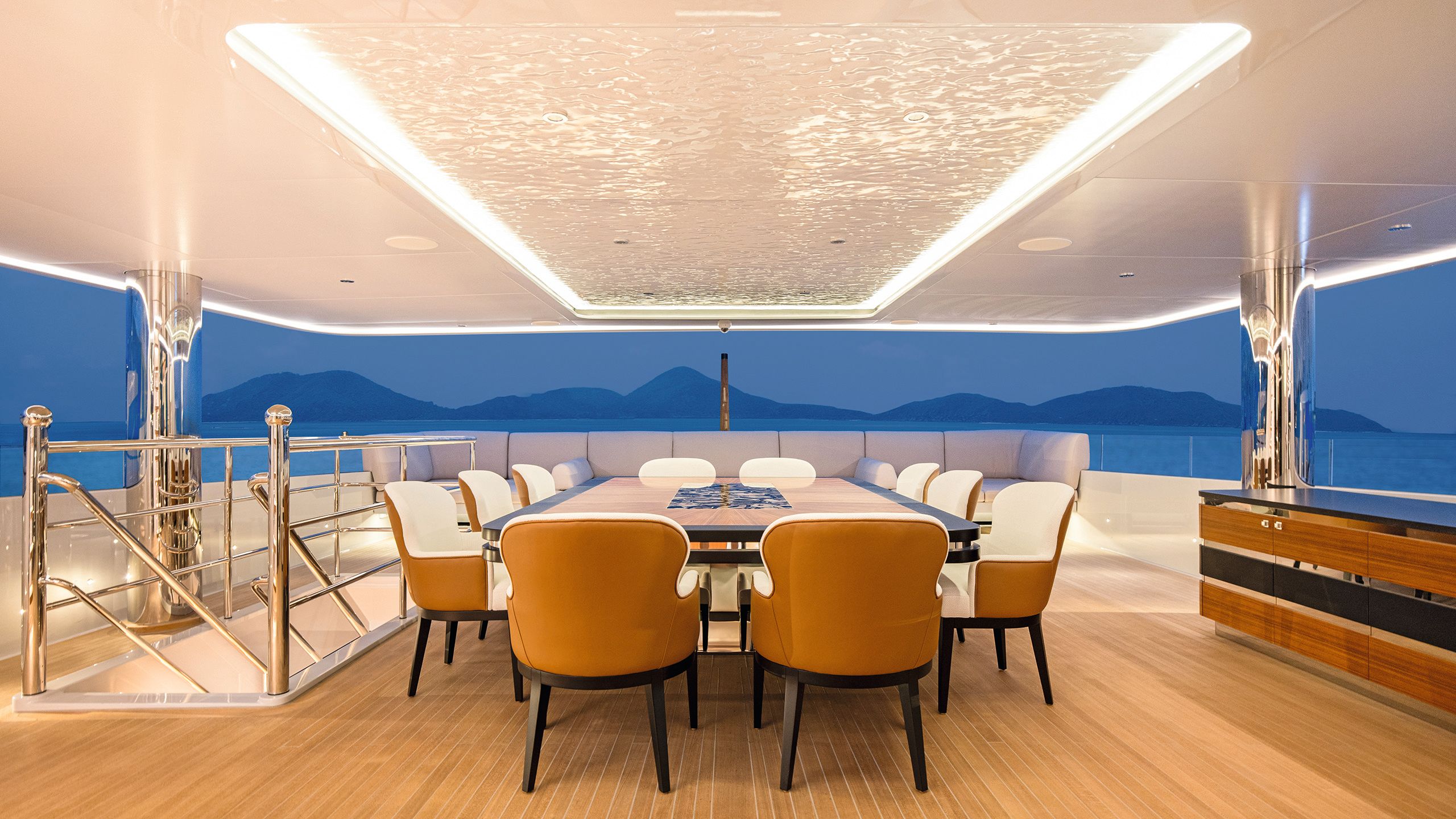
DOLF VERMEULEN
DOLF VERMEULEN
The new design created an exceptional, well-protected sundeck that dresses up for evenings with backlit and underlighting features
He met with Charles and with Marshall and soon after striking a deal with Christensen, they were off and running. “Tim, [the owner] and I went through all the pieces, drawing and information and [the owner] was really articulate on what he wanted to do with the boat, and how he was planning to use it,” Marshall says.
“We redesigned 40 percent of the superstructure and from our selfish side, it meant we were able to put our stamp on it. When you start with a boat that has a heritage, often you get stuck in it. And this boat is not stuck in the Christensen era.
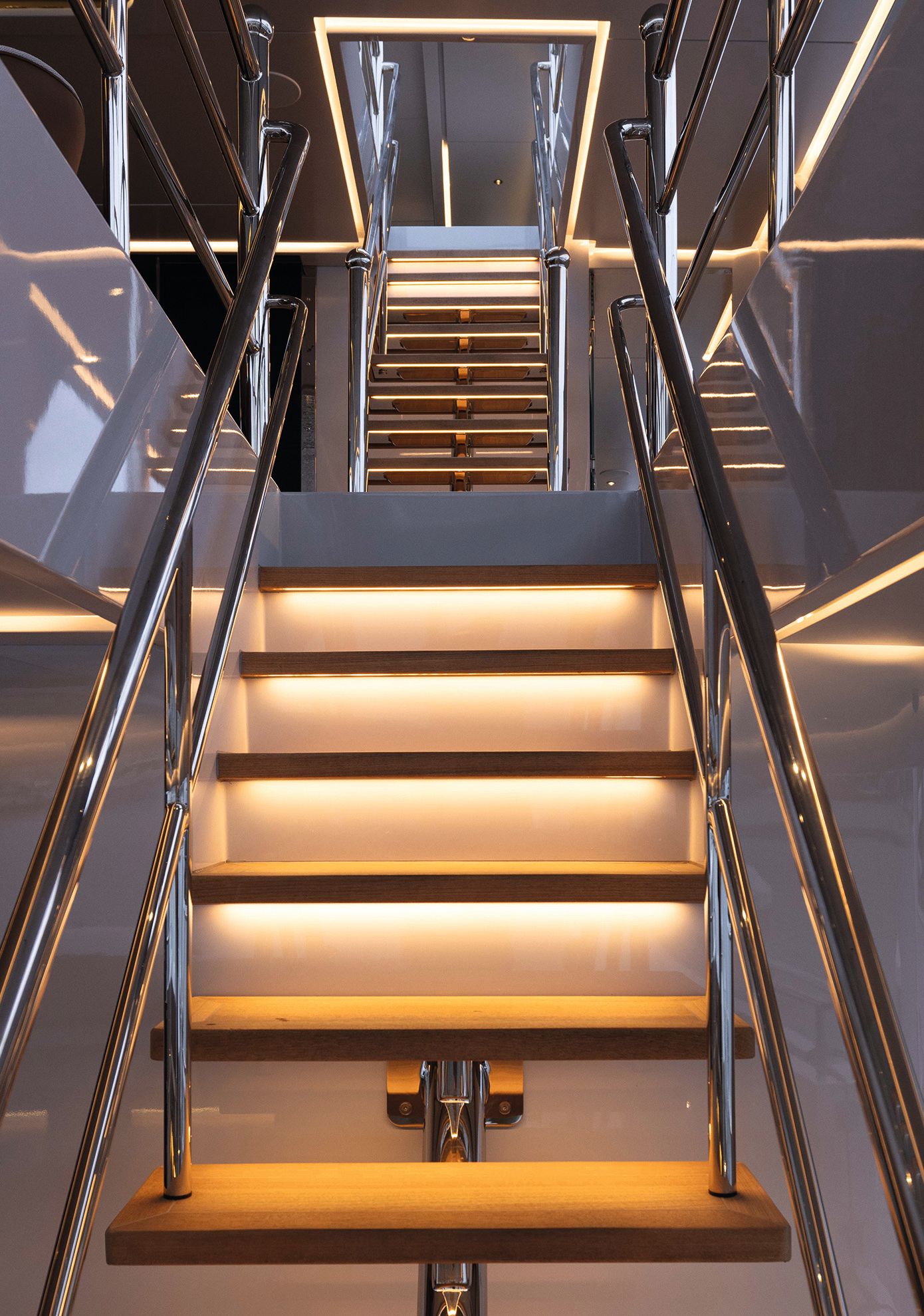
DOLF VERMEULEN
DOLF VERMEULEN
“The balconies transformed the appearance of the boat. The whole [redesigned and raised] hardtop to me gives it a whole different feel — if you go on the previous Christensens, under that hardtop, it’s quite dark. The window lines changed a lot and I like the big opening doors in the sky lounge area; I think it will be amazing when they are down in the Sea of Cortez.”
He met with Charles and with Marshall and soon after striking a deal with Christensen, they were off and running. “Tim, [the owner] and I went through all the pieces, drawing and information and [the owner] was really articulate on what he wanted to do with the boat, and how he was planning to use it,” Marshall says.
“We redesigned 40 percent of the superstructure and from our selfish side, it meant we were able to put our stamp on it. When you start with a boat that has a heritage, often you get stuck in it. And this boat is not stuck in the Christensen era.
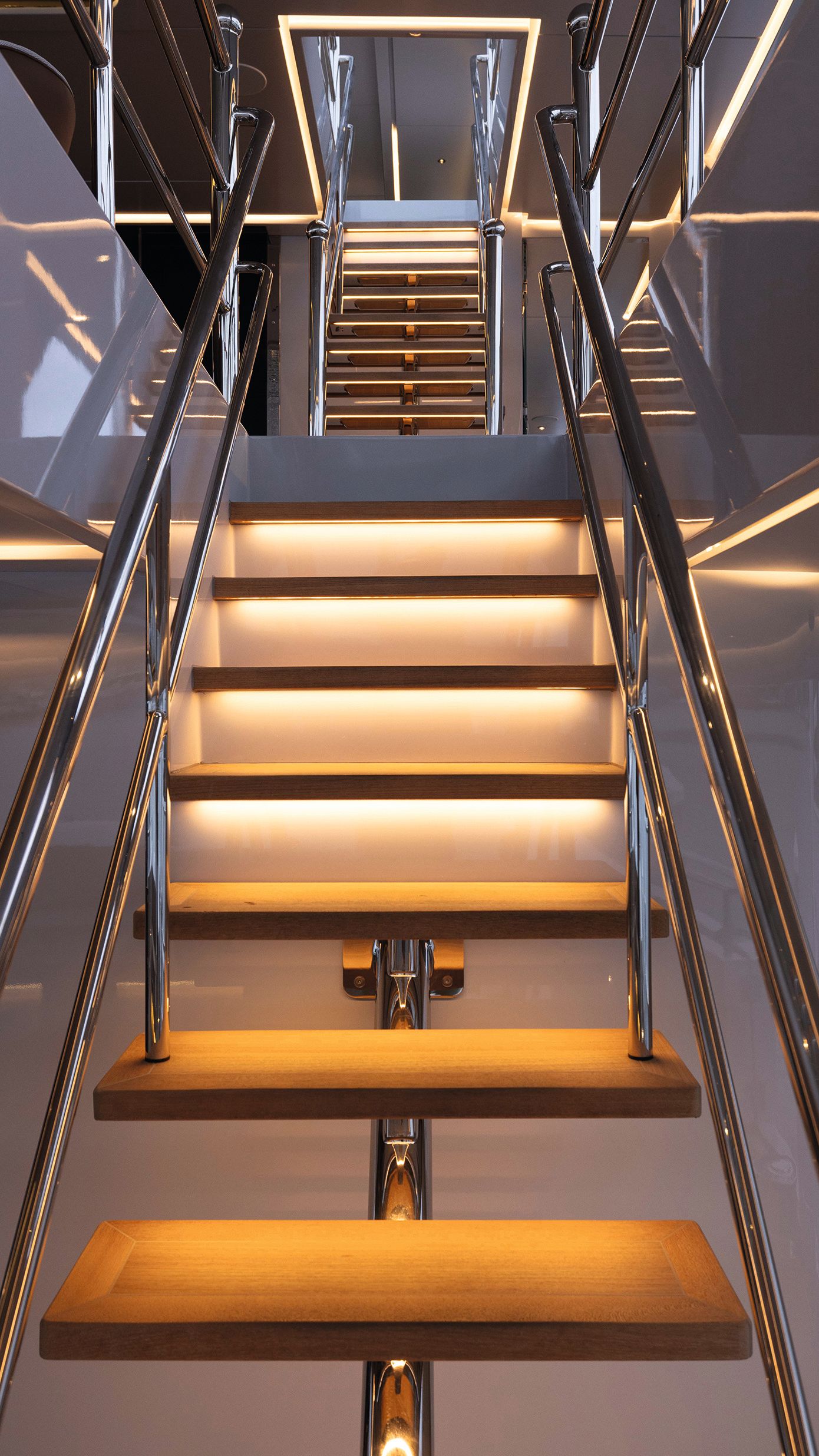
“The balconies transformed the appearance of the boat. The whole [redesigned and raised] hardtop to me gives it a whole different feel — if you go on the previous Christensens, under that hardtop, it’s quite dark. The window lines changed a lot and I like the big opening doors in the sky lounge area; I think it will be amazing when they are down in the Sea of Cortez.”
A key decision for the owner was to hire as his on-site representative Robert Emerson, a long-time Christensen project manager, who moved to Richmond and stayed for the duration of the build (in part due to travel restrictions during the Covid-19 pandemic).
“I was excited when they gave me a call. I agreed to move up to Canada although little did I know I would be stuck there for (the better part) of four years, but I had made a commitment,” Emerson says, who stayed the course.
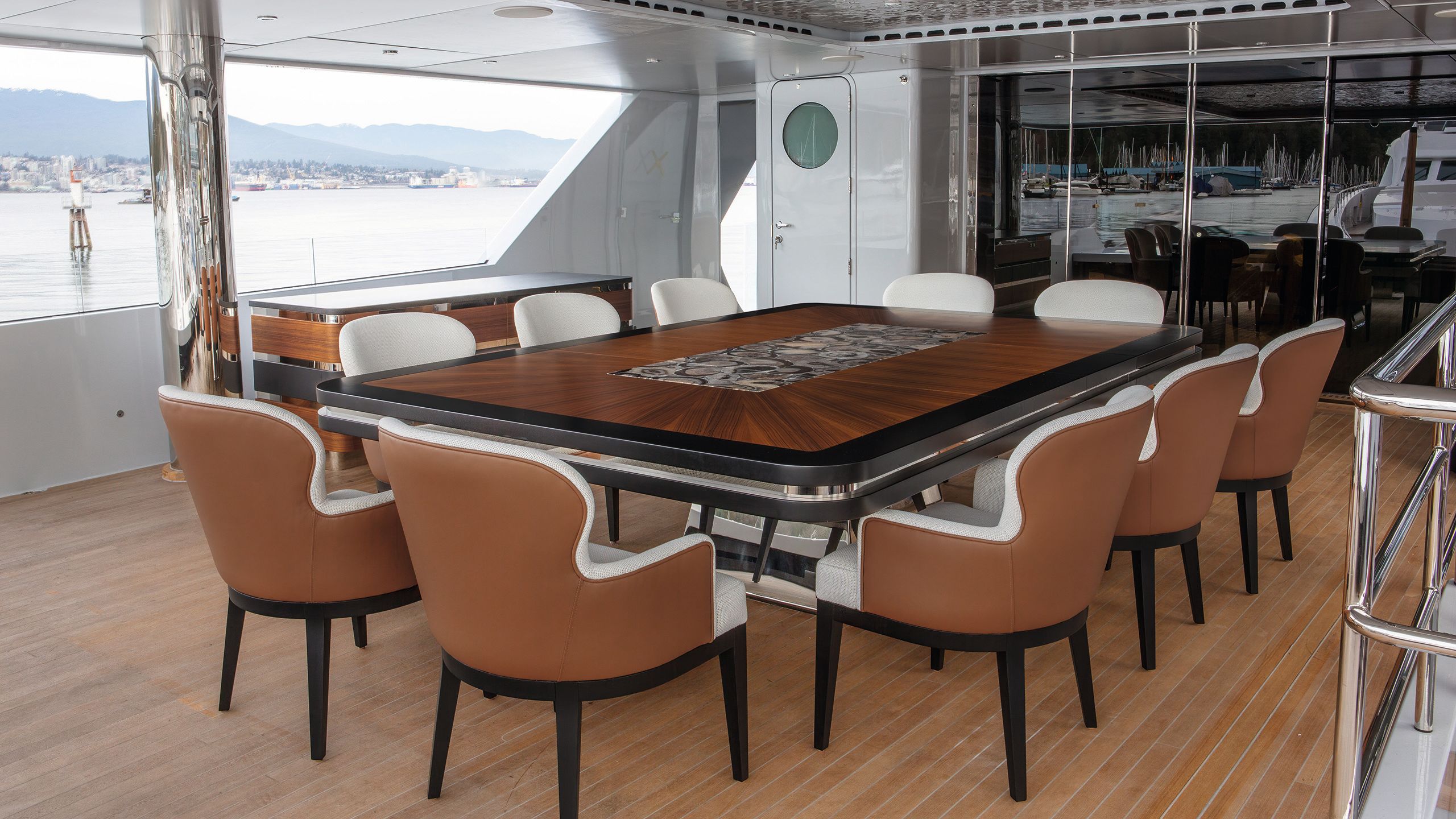
STEPHEN CRIDLAND
STEPHEN CRIDLAND
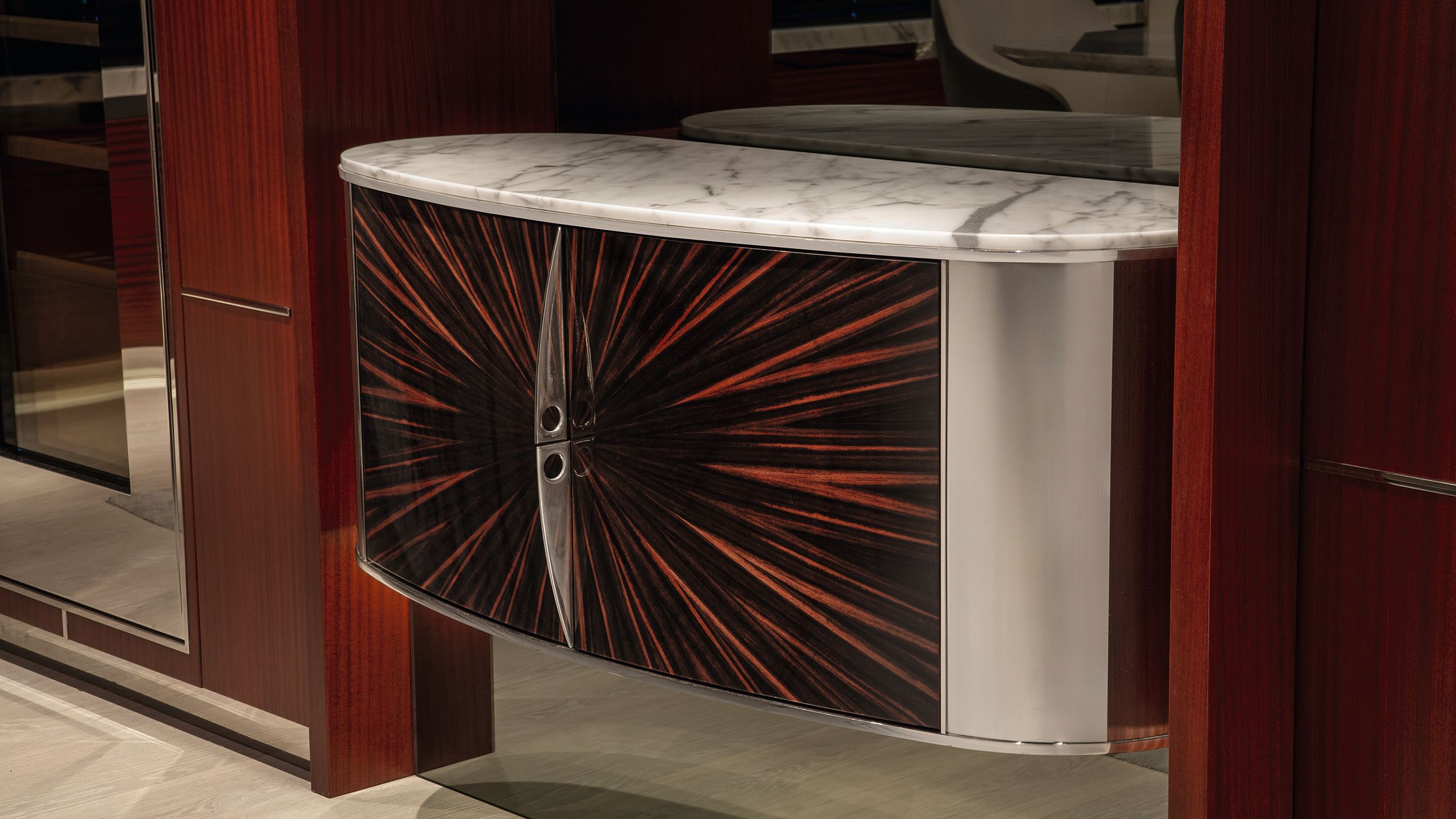
STEPHEN CRIDLAND
STEPHEN CRIDLAND
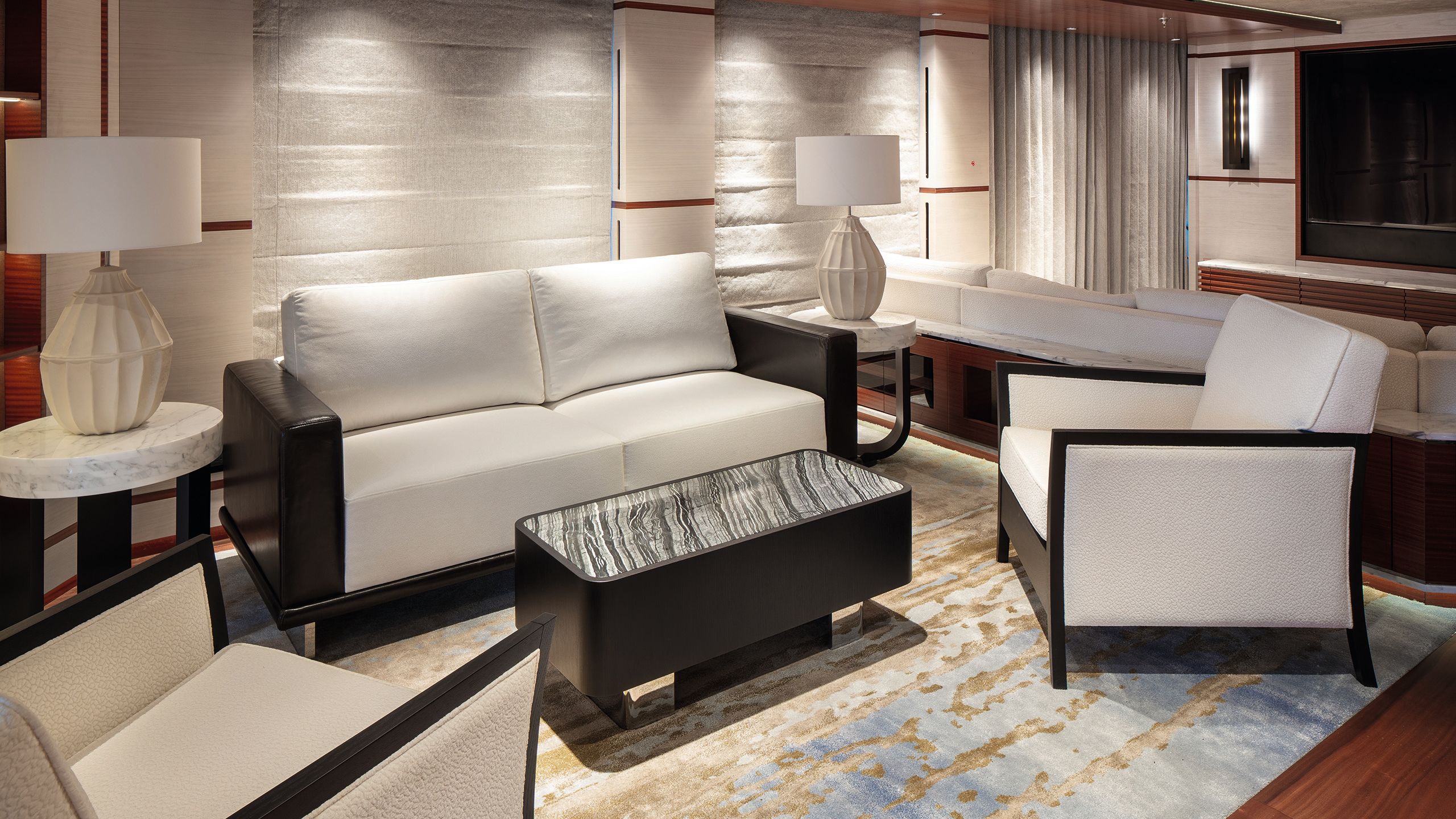
STEPHEN CRIDLAND
STEPHEN CRIDLAND
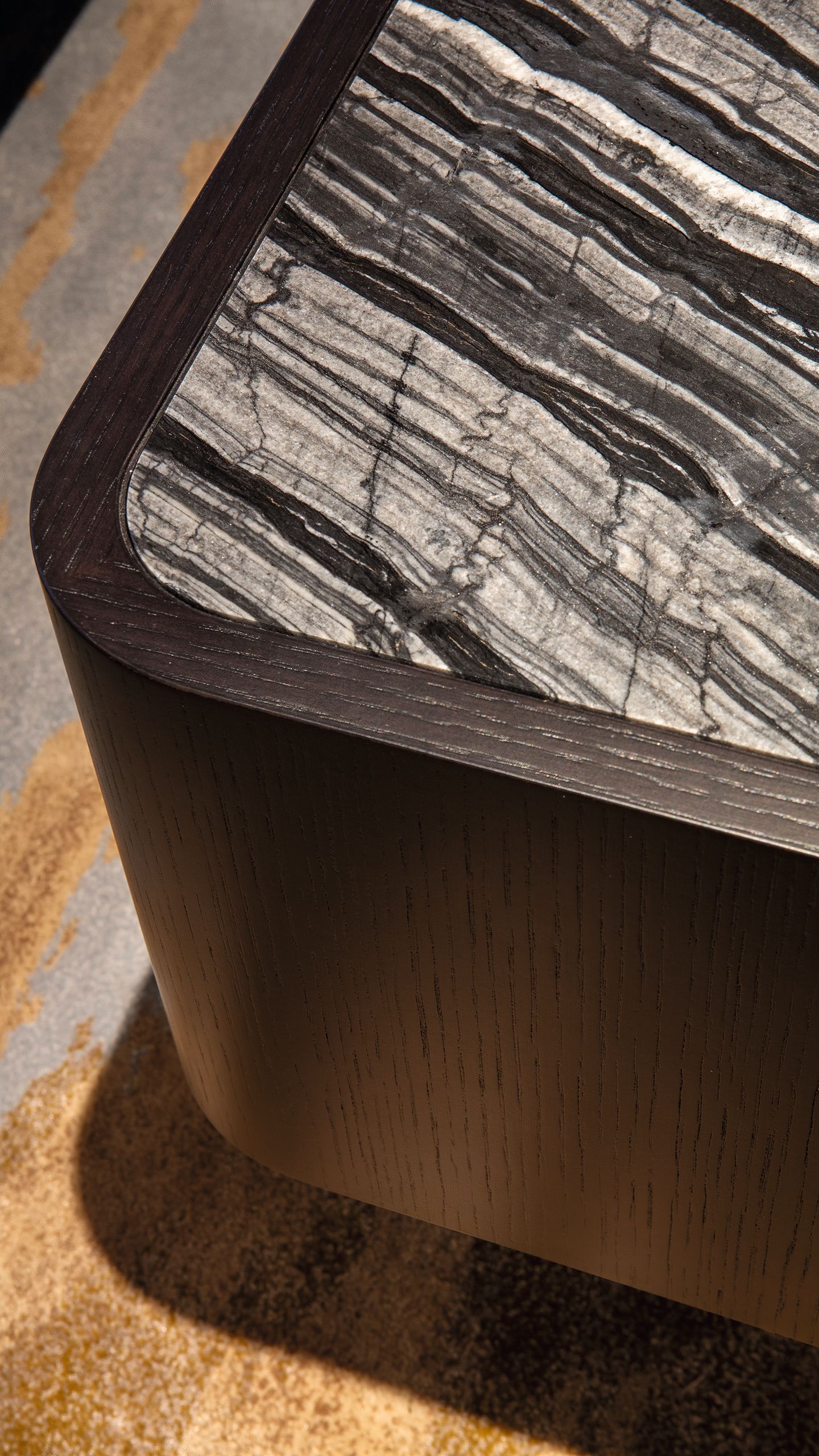
STEPHEN CRIDLAND
STEPHEN CRIDLAND
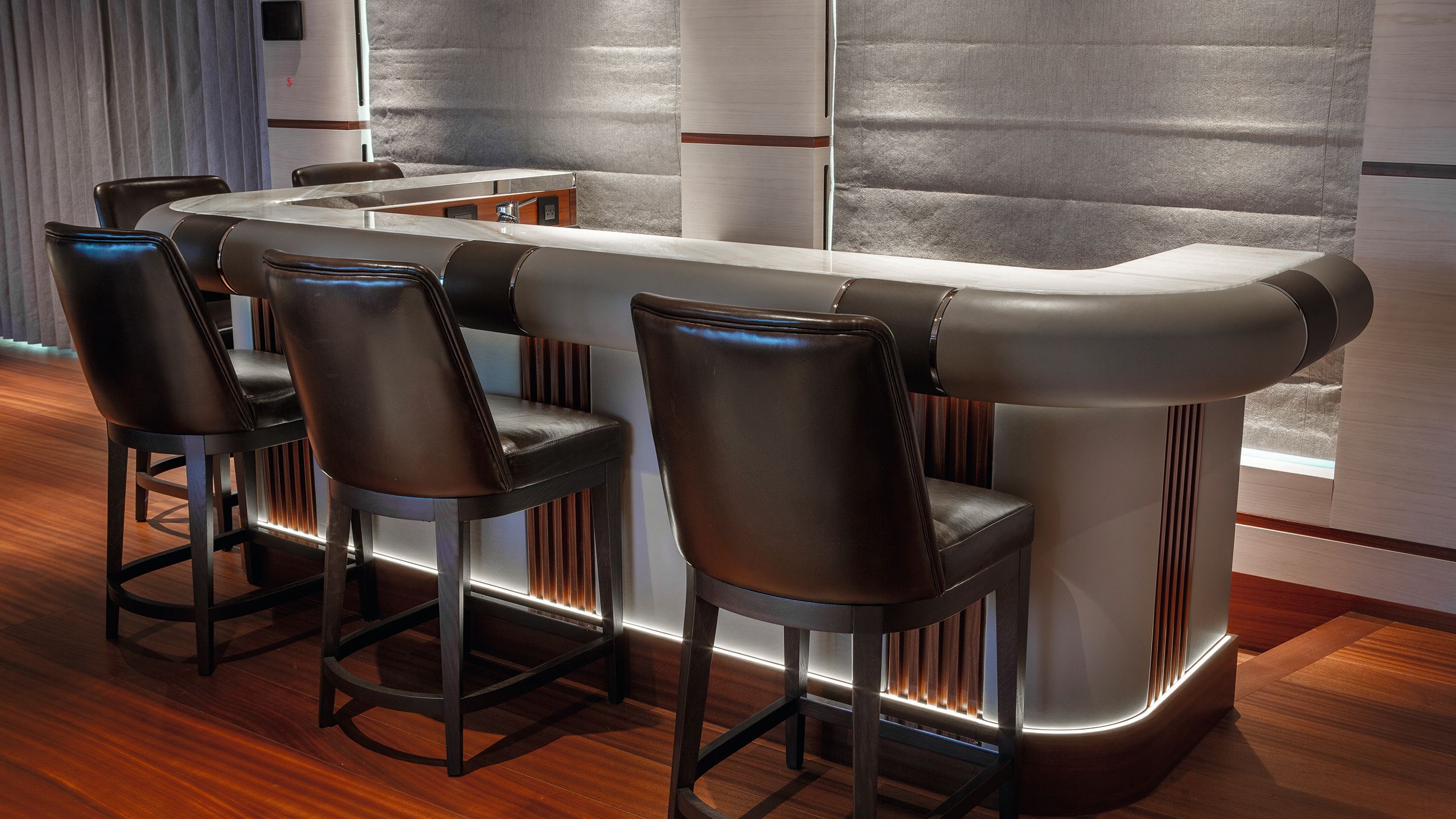
STEPHEN CRIDLAND
STEPHEN CRIDLAND
Custom pieces by Durante based on H2 Yacht Design’s and the owner’s experience include a dining table with inlaid agate on the bridge deck (top left); more of their pieces furnish the sky lounge (bottom right). Genesis Interiors built the interior and a starburst cabinet for the dining area (top right)
His inside knowledge was also helpful to the shipyard as they sorted through what came as a complex puzzle. “We had unstructured building blocks and worked with Greg [Marshall] and his team to modify, change, restyle, build new molds and put everything together. I think it was a smart decision to use the proven information of Christensen and improve on everything else,” Charles says.
“H2’s beautiful design blends numerous lavish materials, which required a detailed eye and skilled installation”
One key decision was to downsize the planned engine package, or as Marshall says, “rightsize” it. “The reality is there was a whole era of [larger] engines that provided no value to the operation of the vessel. It’s just too much power. You have big engines, half serving the purpose of ballast, making the engine room hard to navigate and making the boat heavier,” he says.
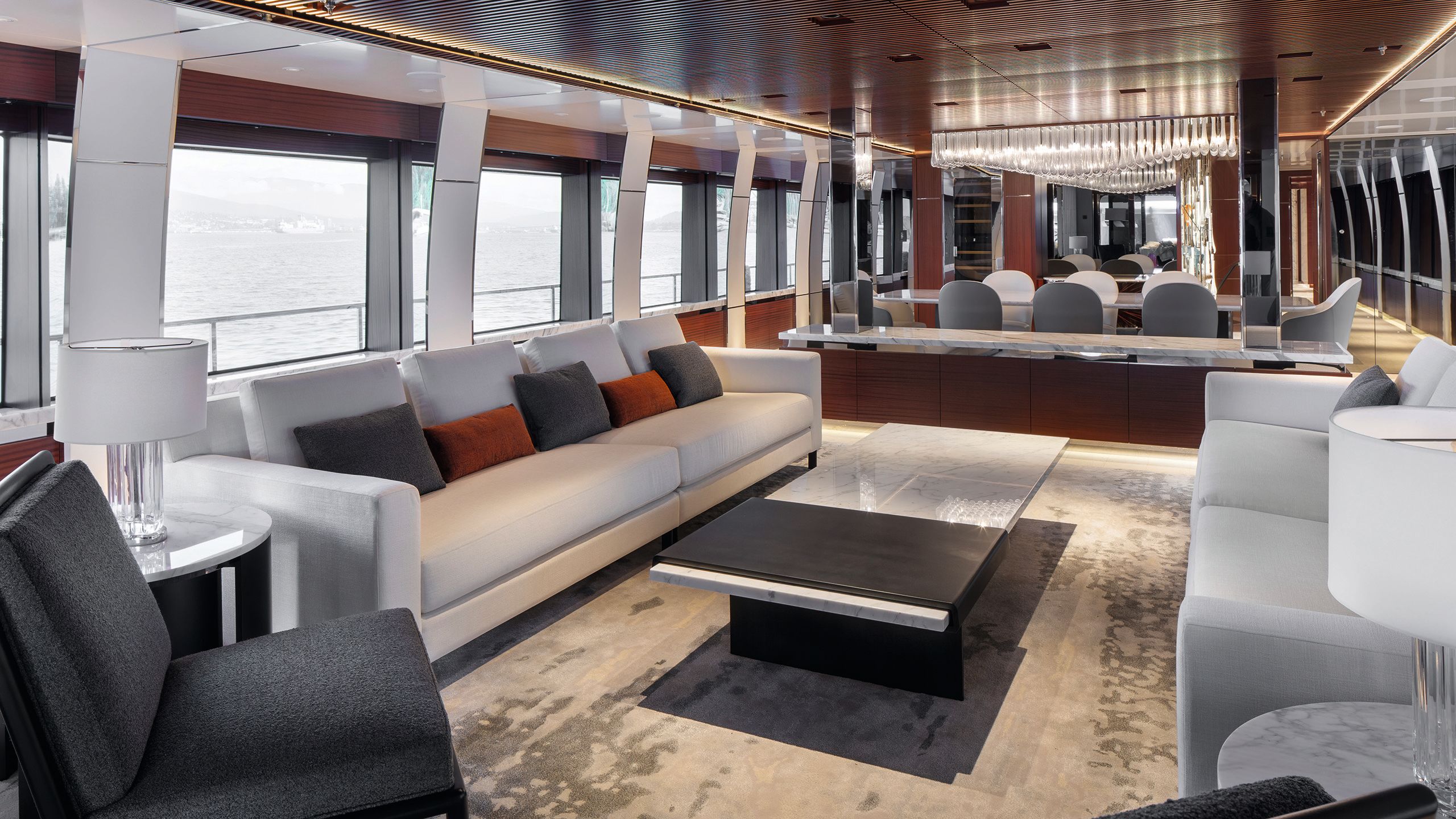
STEPHEN CRIDLANDMore custom pieces by Durante Furniture furnish the sky lounge
STEPHEN CRIDLANDMore custom pieces by Durante Furniture furnish the sky lounge
It’s a big part of the sustainability conversation, and the owner was fully on board with the idea. Those big engines, the owner says, are “just a waste of money. I think we did it right. We invested the right amount into the right machines so that it will last a long time and be economical to use as well,” he says.
The new engines are two Tier III MTU 12V 2000s, deploying 1,700 horsepower each. “I think they’re the perfect size for the boat.” Emerson says the yacht tops out at 15 knots with engines at full speed and happily cruises at 12 knots. “Christensens were never fast boats,” he says, “top speed was around 18 knots.”
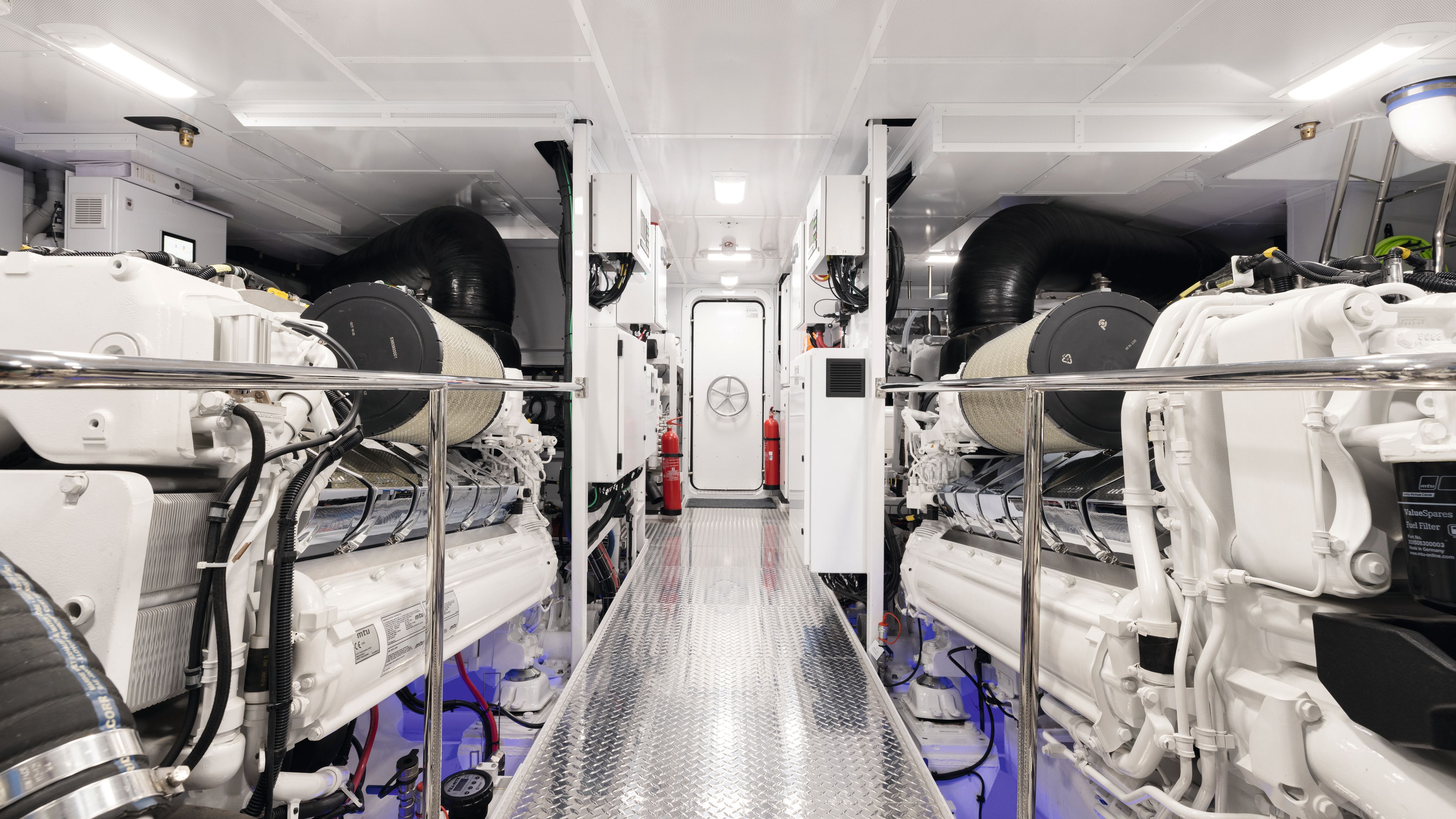

DOLF VERMEULEN
DOLF VERMEULEN
“We invested the right amount into the right machines so that it will last a long time and be economical to use as well”
Interior-wise, the owner elected to work with H2 Yacht Design of London. “I saw a couple of boats that they did. And I really liked [their work] because it has that European feel of luxury, but it isn’t so high end that you can’t feel comfortable sitting down.”
Jonny Horsfield, founder of H2, says a conversation with the owner revealed he wanted something masculine. “He liked the interior of many Italian boats. He liked the crisp, sharper sort of look, the rib design and a more neutral palette.”
Being a developer, the owner was knowledgeable. “He’d obviously worked with design before and we had to impress him,” Horsfield says. “He liked mahogany, which is a warm, lovely wood and when you use it with ribs and white carpets and a lot of grey, it’s very cool.”
One complication of the build was Covid-19. H2’s team never got to visit the shipyard, and the builder ended up selecting substitutes for some of the fabrics and stones. Charles does not want to run a top-heavy organisation and prefers working with trusted sub-contractors. For this project, he worked with Genesis Interiors, which built the interior both in the US and in Italy and installed it on site in Richmond.
The owner brought in Vancouver-based family-run furniture maker Durante Furniture, and it crafted all the loose pieces on board according to H2’s design vision. “I have nothing but good things to say about them,” the owner says.
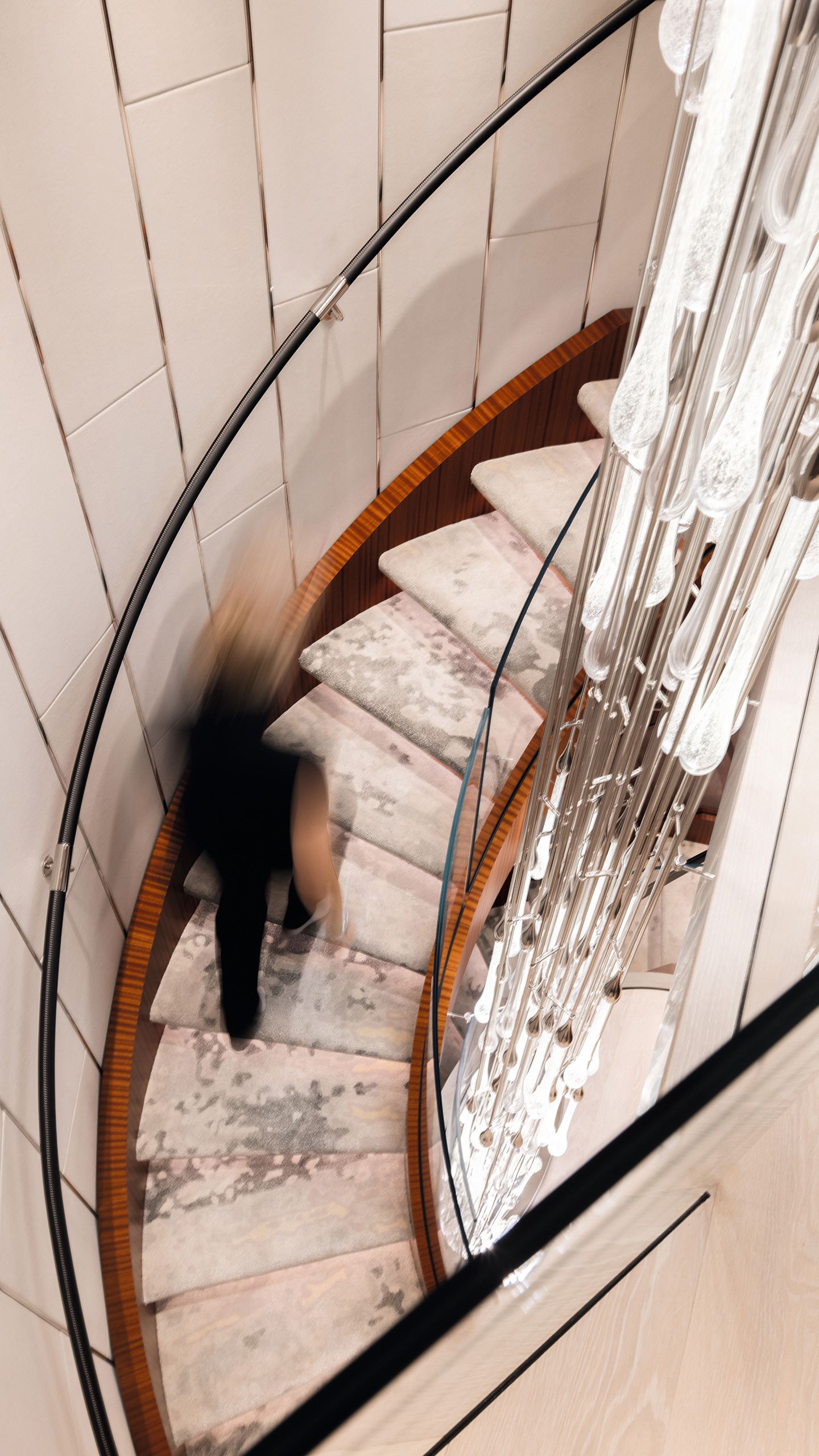
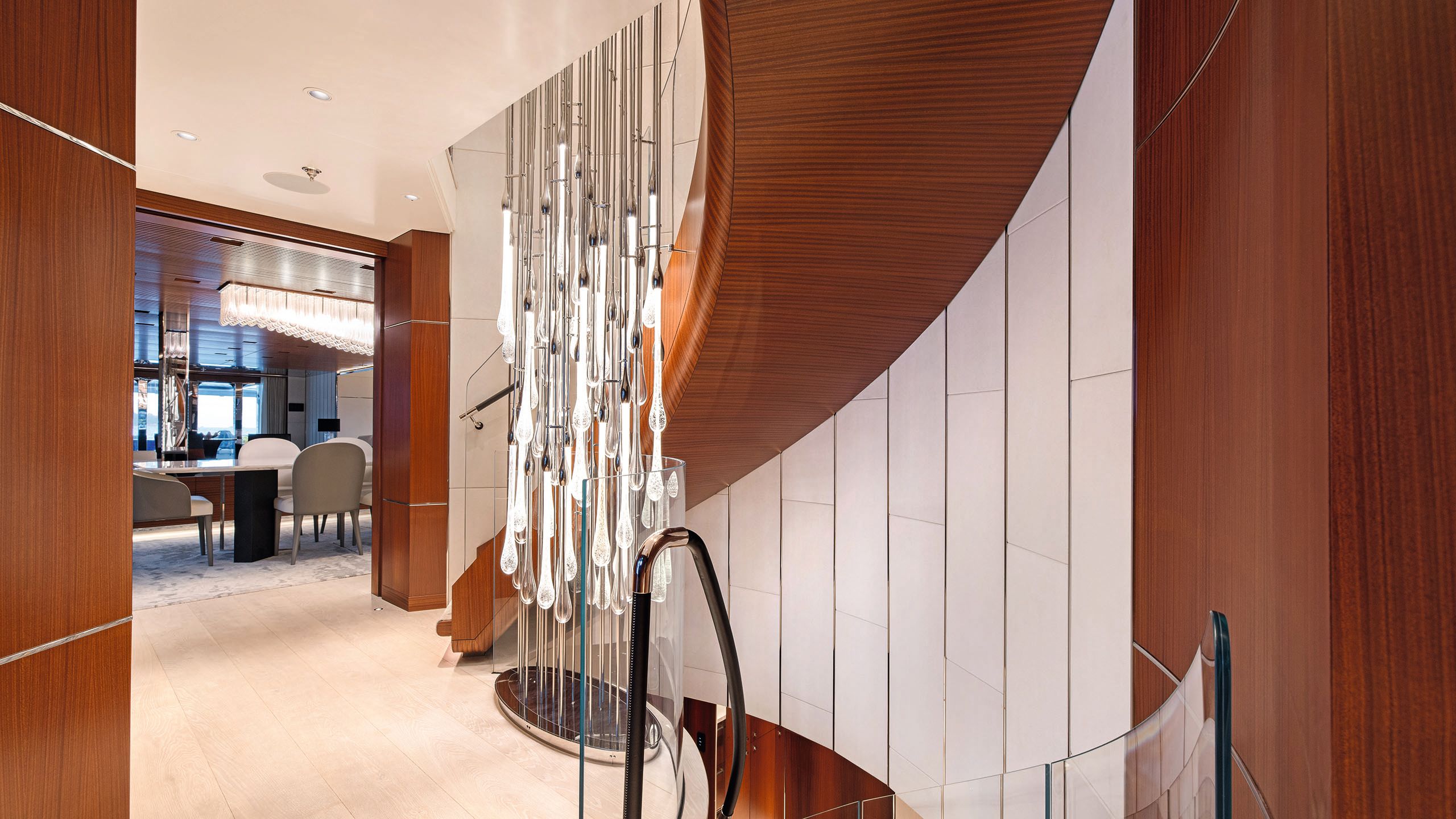
DOLF VERMEULEN
DOLF VERMEULEN
“The level of details, it’s the highest we’ve ever done... everything is substantial and super high end”
The design is precise and detailed with a great deal of stainless steel to enhance the look. As we walked around the decks, Charles displays an all-Canadian candour and modesty, acknowledging the challenges that such a project caused and how far the design by H2 and the owner’s expectations expanded the yard’s repertoire.
“The level of details, it’s the highest we’ve ever done,” he says. “Feel this door, feel the quality, everything is substantial and super high-end. This is a good example,” he adds, gently pushing with his fingertips the door, which catches quietly as if pulled by an invisible hand. “It’s next level.”

DOLF VERMEULENPainstakingly stabilized, the staircase lighting fixture is 4.5 metres high and runs from the main deck to the bridge deck
DOLF VERMEULENPainstakingly stabilized, the staircase lighting fixture is 4.5 metres high and runs from the main deck to the bridge deck
A series of columns clad in white leather and stainless steel on the sides frame the windows of the main salon. The effect is to expand the views and magnify the outside light.
Above the dining area is a Crystal Caviar light fixture made of individual glass bulbs, all painstakingly stabilized. A small buffet with mahogany veneer in a starburst pattern, a delicate stainless-steel handle and marble top, done by Genesis, is a most elegant storage cabinet for tableware behind the dining table.
The design is precise and detailed with a great deal of stainless steel to enhance the look. As we walked around the decks, Charles displays an all-Canadian candour and modesty, acknowledging the challenges that such a project caused and how far the design by H2 and the owner’s expectations expanded the yard’s repertoire.
“The level of details, it’s the highest we’ve ever done,” he says. “Feel this door, feel the quality, everything is substantial and super high-end. This is a good example,” he adds, gently pushing with his fingertips the door, which catches quietly as if pulled by an invisible hand. “It’s next level.”
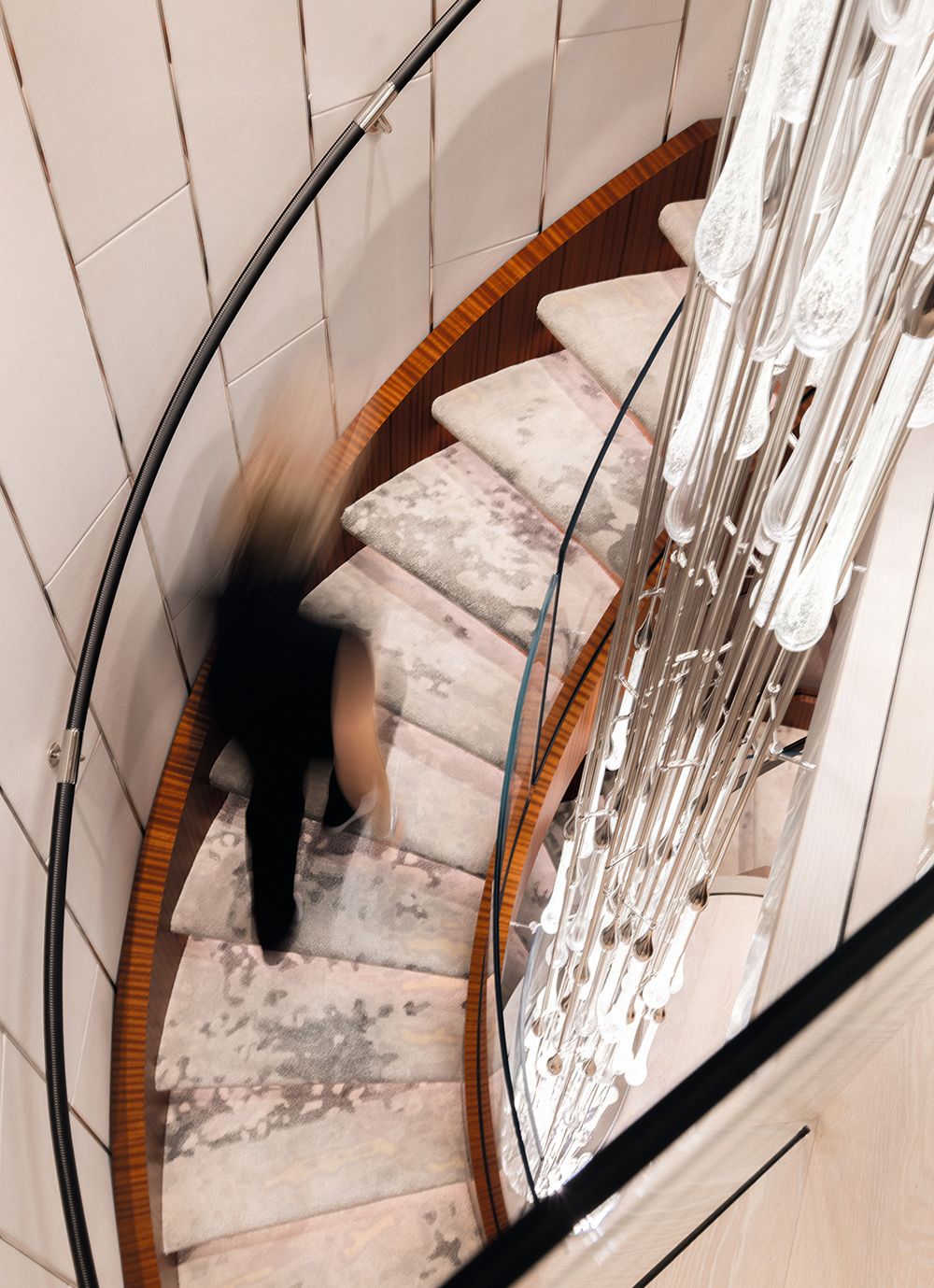
DOLF VERMEULENThe staircase was one of the most complex interior components, involving the cooperation of nine companies
DOLF VERMEULENThe staircase was one of the most complex interior components, involving the cooperation of nine companies
A series of columns clad in white leather and stainless steel on the sides frame the windows of the main salon. The effect is to expand the views and magnify the outside light. Above the dining area is a Crystal Caviar light fixture made of individual glass bulbs, all painstakingly stabilized.
A small buffet with mahogany veneer in a starburst pattern, a delicate stainless-steel handle and marble top, done by Genesis, is a most elegant storage cabinet for tableware behind the dining table.
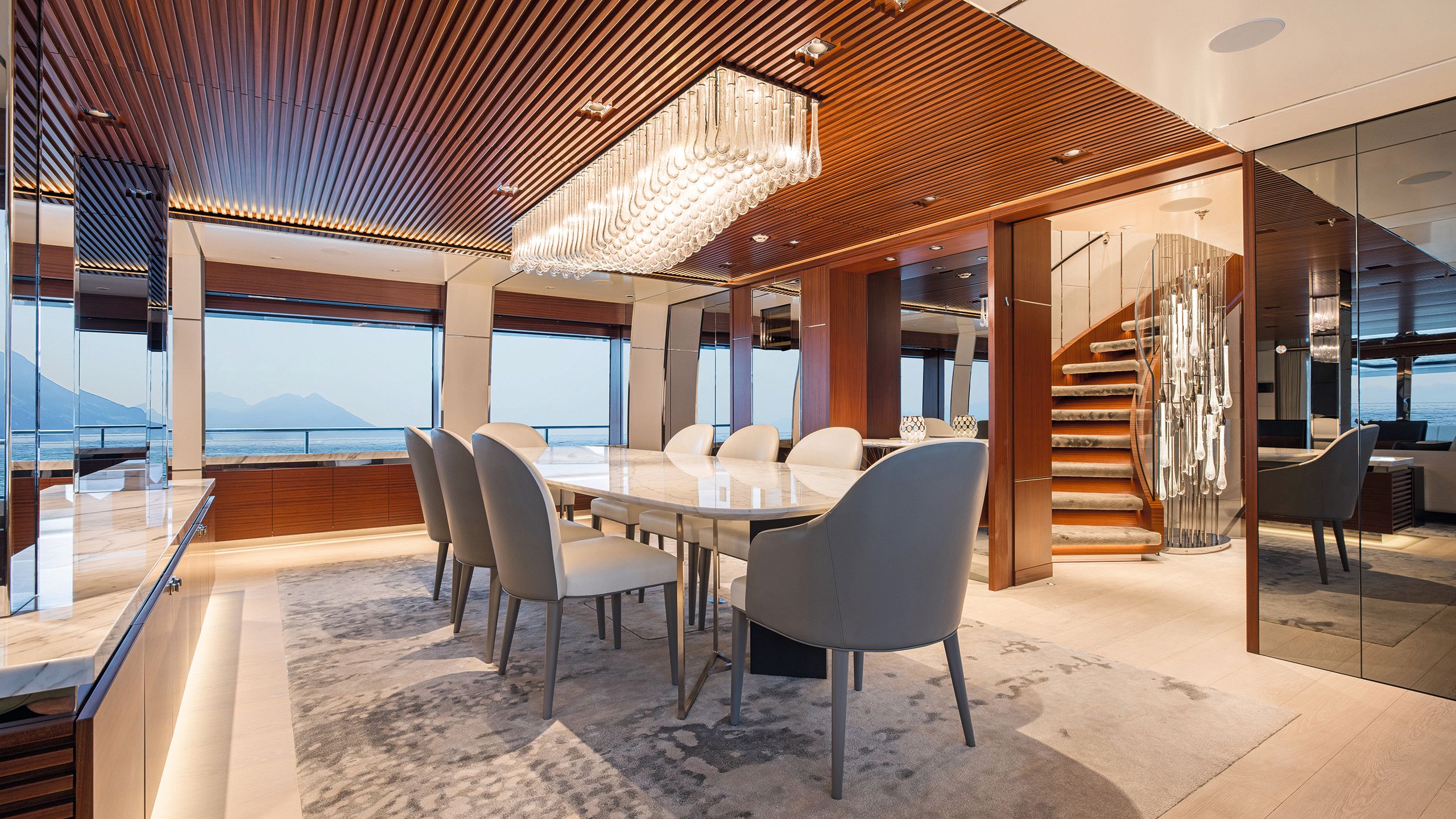
DOLF VERMEULEN
DOLF VERMEULEN
Danzante Bay has an elevator, but the centrepiece is a two-story-high light fixture from Crystal Caviar with teardrop-shaped crystals descending at the centre of the stairs. “The foyer and staircase are one of the most complex areas of the interior,” Crescent interior project manager James Plant says.
“The staircase, with its compound curve spanning three decks, is illuminated by a 4.5-metre chandelier running from the main to bridge deck. Nine companies worked together to create this centrepiece, which combines curved glass balustrades, leather-wrapped handrails, inlaid stainless steel and embellished leather panels. H2’s beautiful design blends numerous lavish materials, which required a detailed eye and skilled installation.”
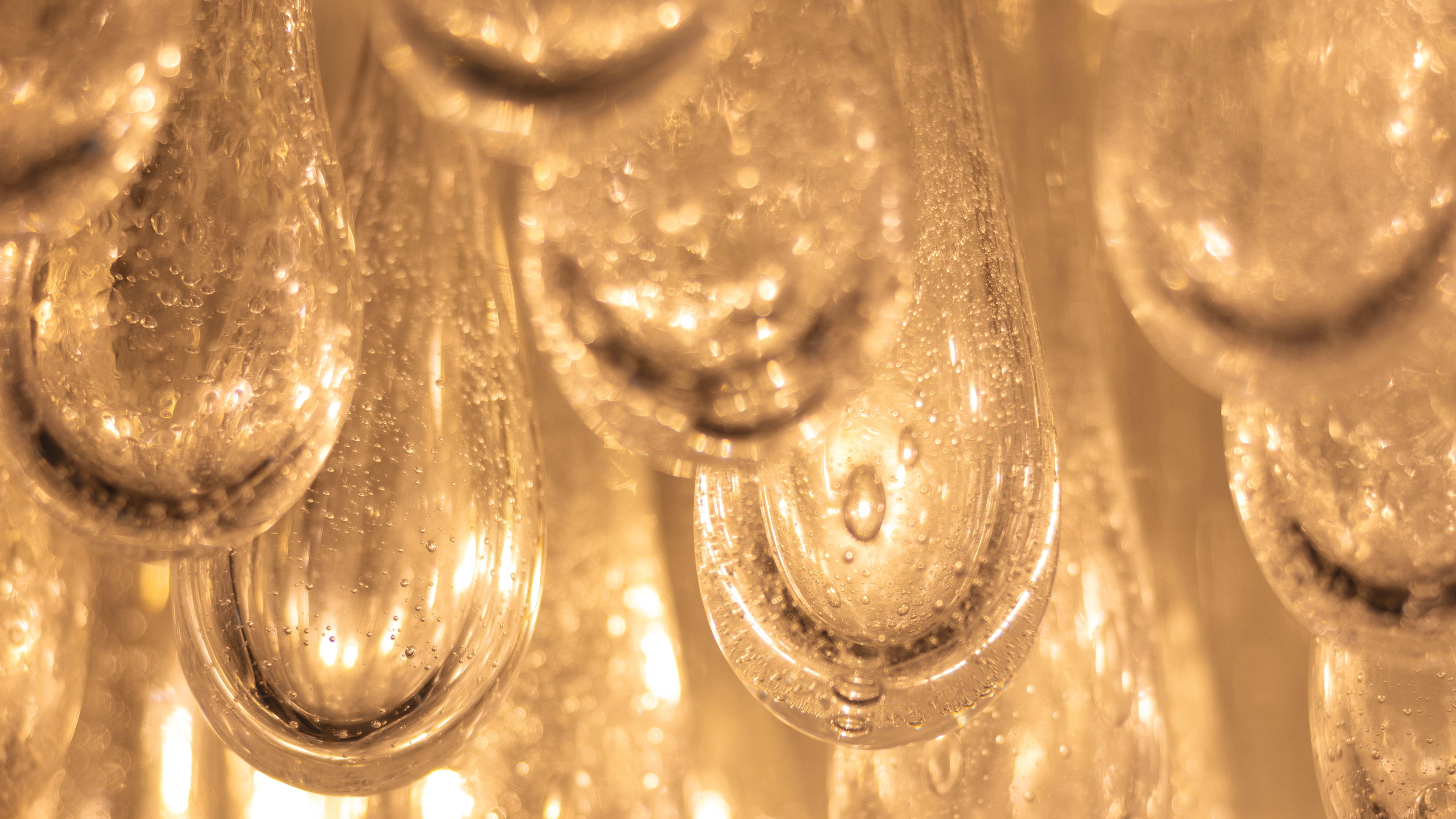
Forward on the main deck is the owner’s cabin, which has an elegant wardrobe with a view. The backlit marble installed in a stunning V pattern in the bathroom’s massive shower comes from Canadian company SSC Countertops.
Fluted wood, stitched leather, stainless steel details and eye-catching marbles repeat in the lower deck cabins. In the VIP stateroom, a system of louvres separates the large bedroom from a bathroom with a backlit onyx wall and a bathtub.
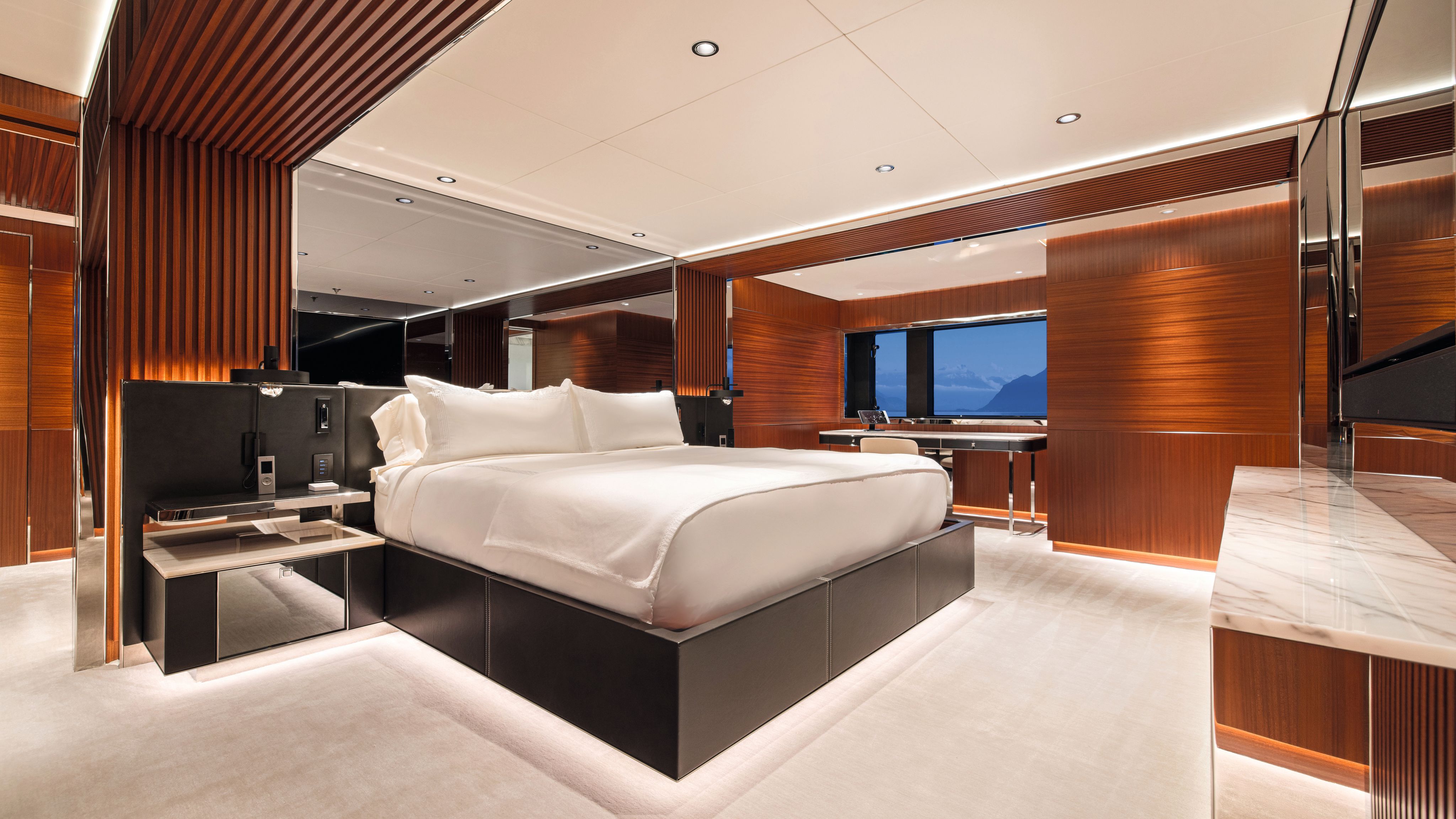
DOLF VERMEULEN
DOLF VERMEULEN
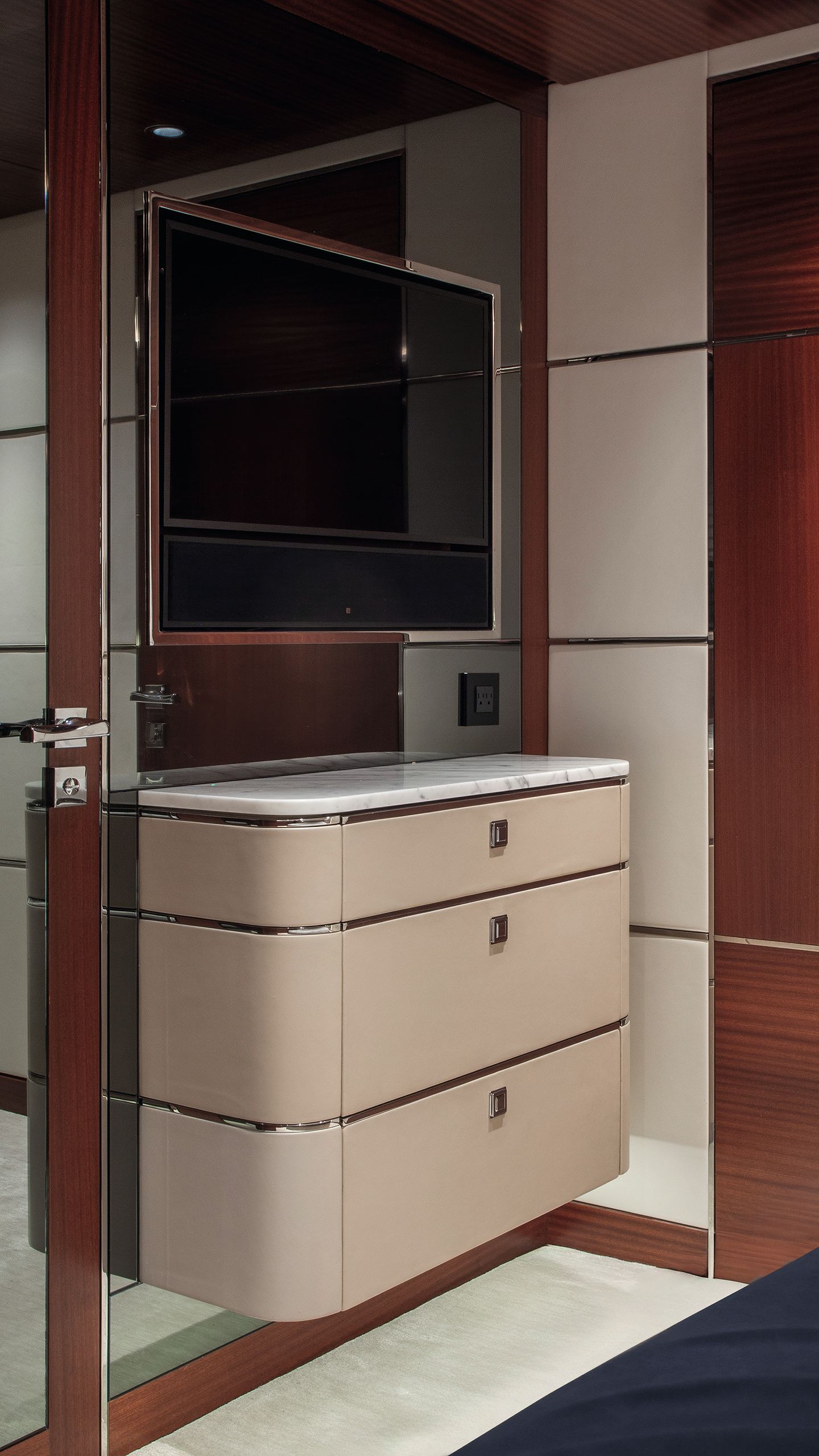
STEPHEN CRIDLAND
STEPHEN CRIDLAND
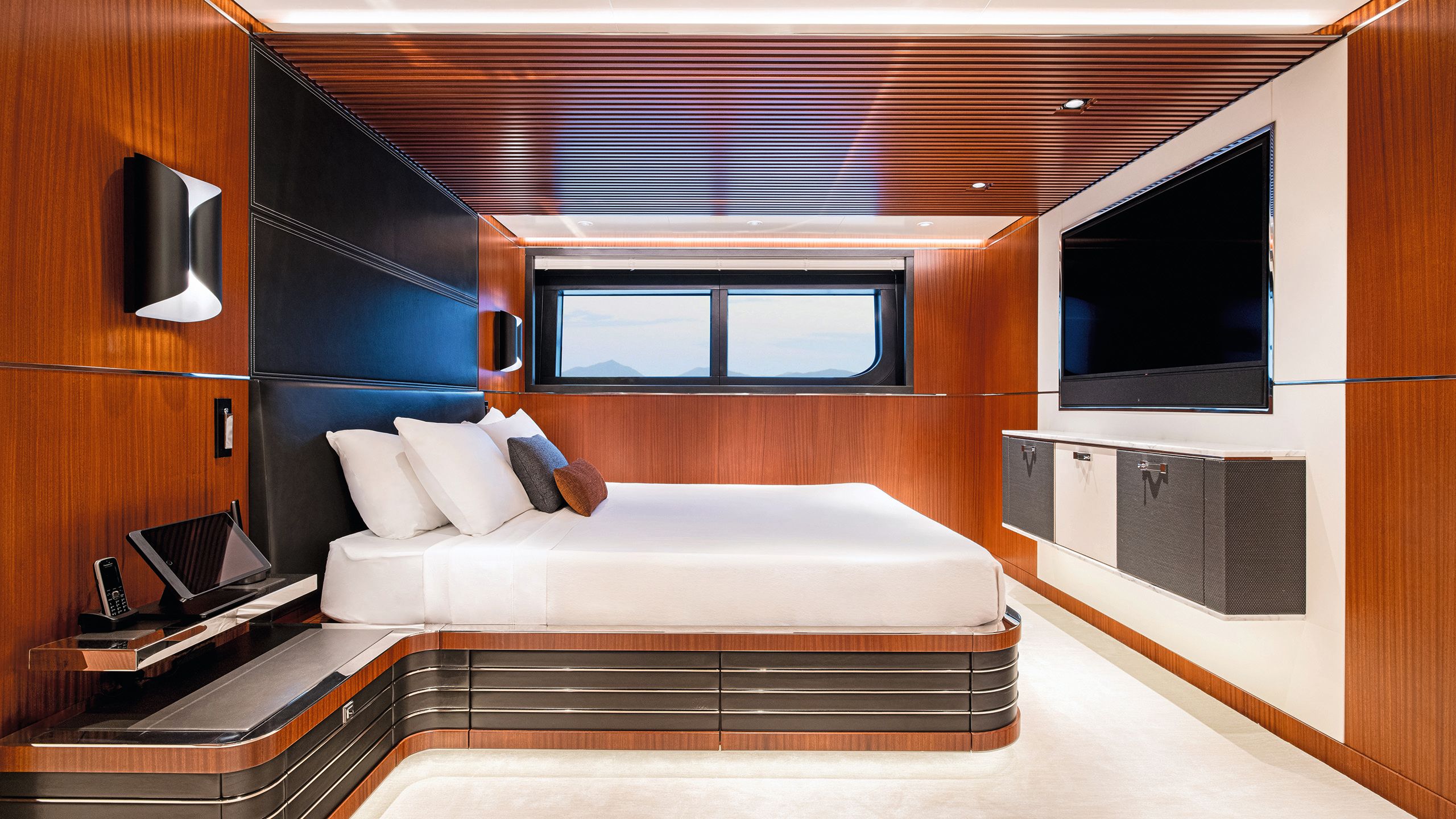
DOLF VERMEULEN
DOLF VERMEULEN
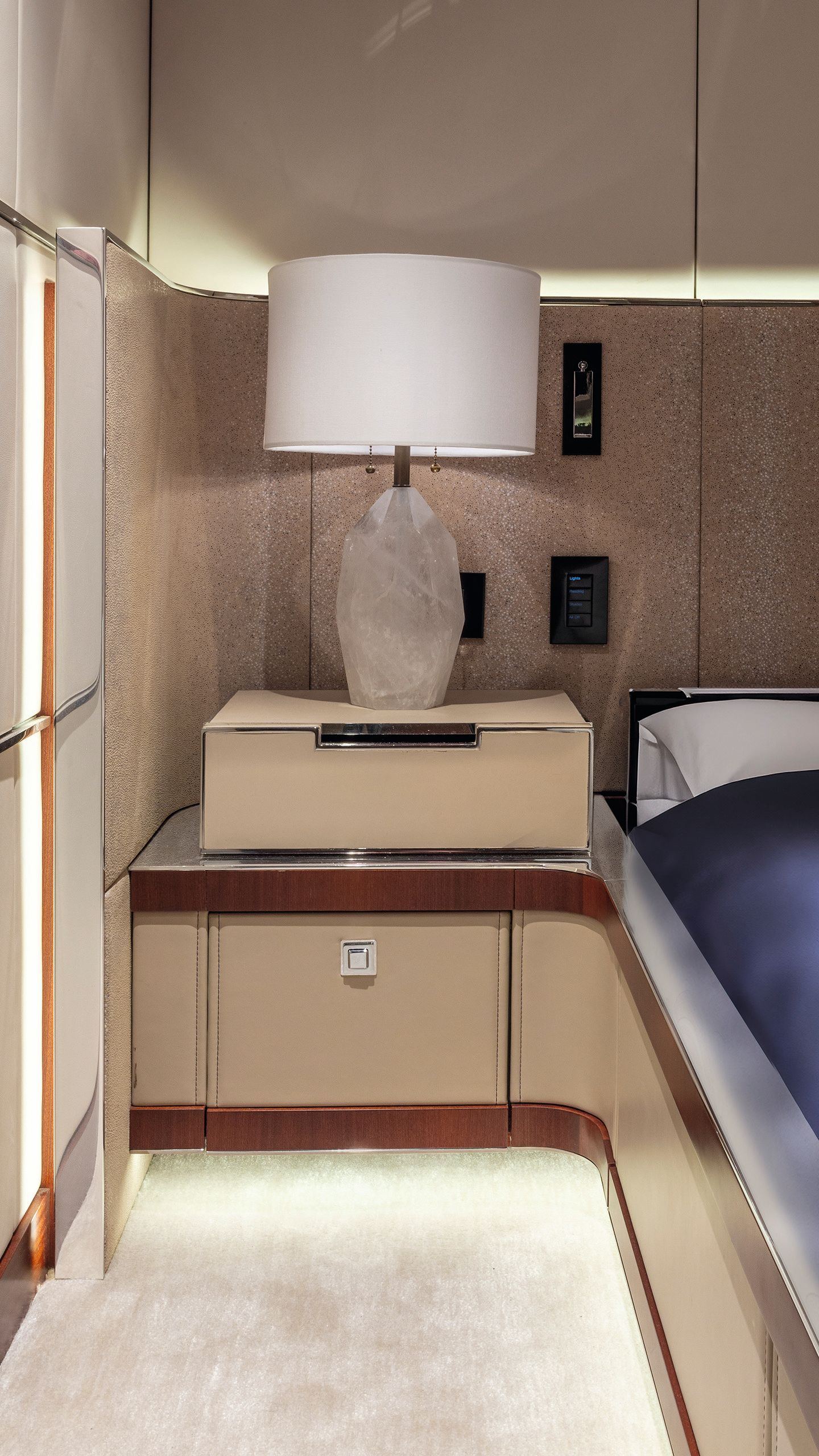
STEPHEN CRIDLAND
STEPHEN CRIDLAND
Fluted wood, stainless-steel accents and backlit marble lend the owner’s cabin and all five guest cabins a luxurious feel (top); the slightly masculine decor has real elegance and the VIP (centre) is full beam
The social hub of the yacht will be the two upper decks. The sky lounge has great big windows — nearly floor to ceiling — and a stunning bar and stools done by Durante, as well as a large space for dining.
“The owner says he’ll spend 90 percent of his time here,” Charles says, and it’s easy to see why. “The furnishings in this space subtly incorporate design elements found throughout the interior. Notably, the bar, credenza and TV cabinet carefully blend inlaid mirror-polished stainless steel, marble and leatherwork,” Plant says, who picks the sky lounge as the most representative space of the yacht’s design spirit.
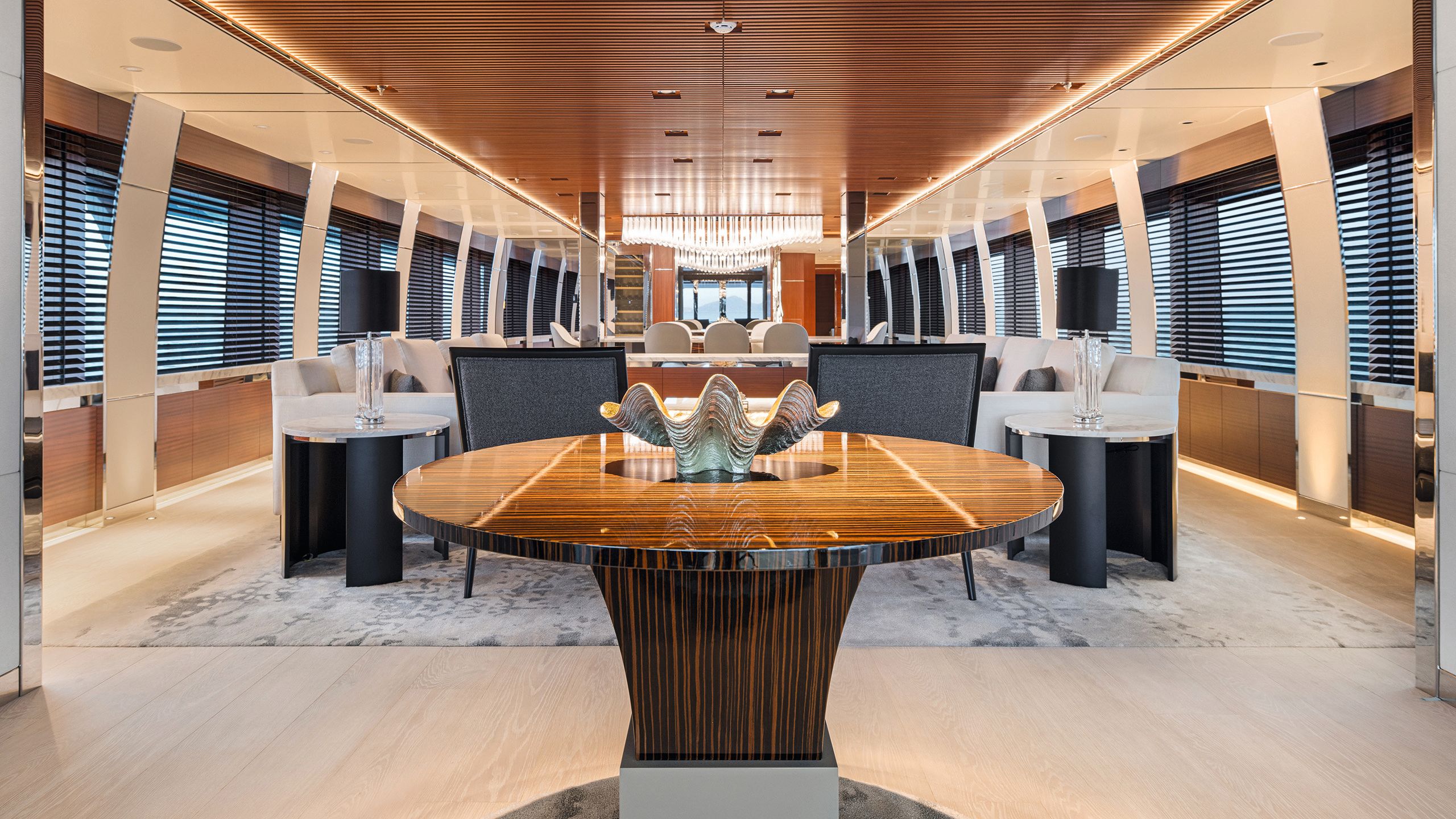
DOLF VERMEULEN
DOLF VERMEULEN
Just a few steps above is the massive sundeck with its expanded hardtop providing extra shade.
It also has a custom bar with leather and stainless steel, a projector and movie screen and room for tenders and toys. The coffee tables have backlit agate stones. “It will be really impressive in the evening,” Charles says.
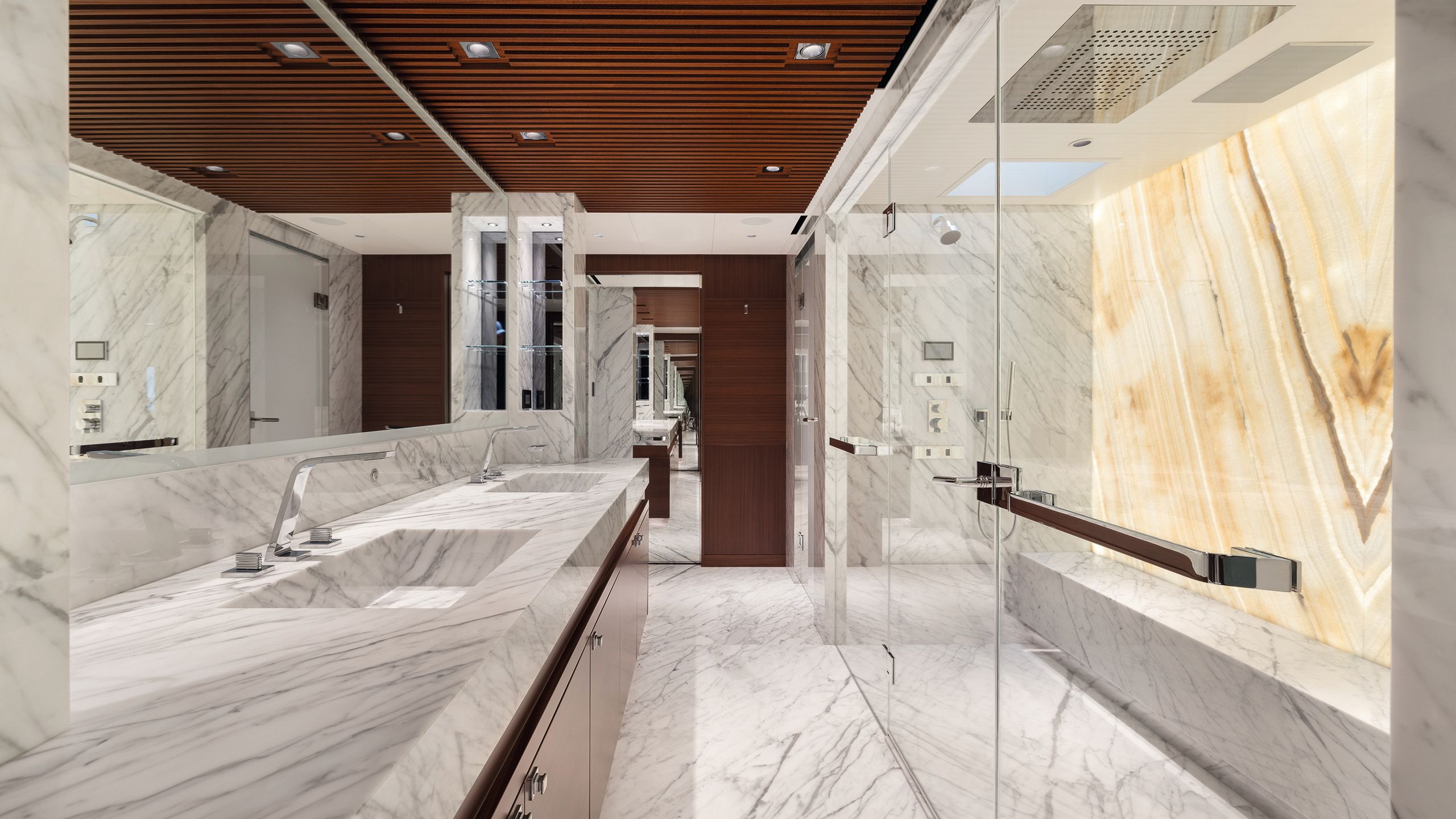
DOLF VERMEULEN
DOLF VERMEULEN
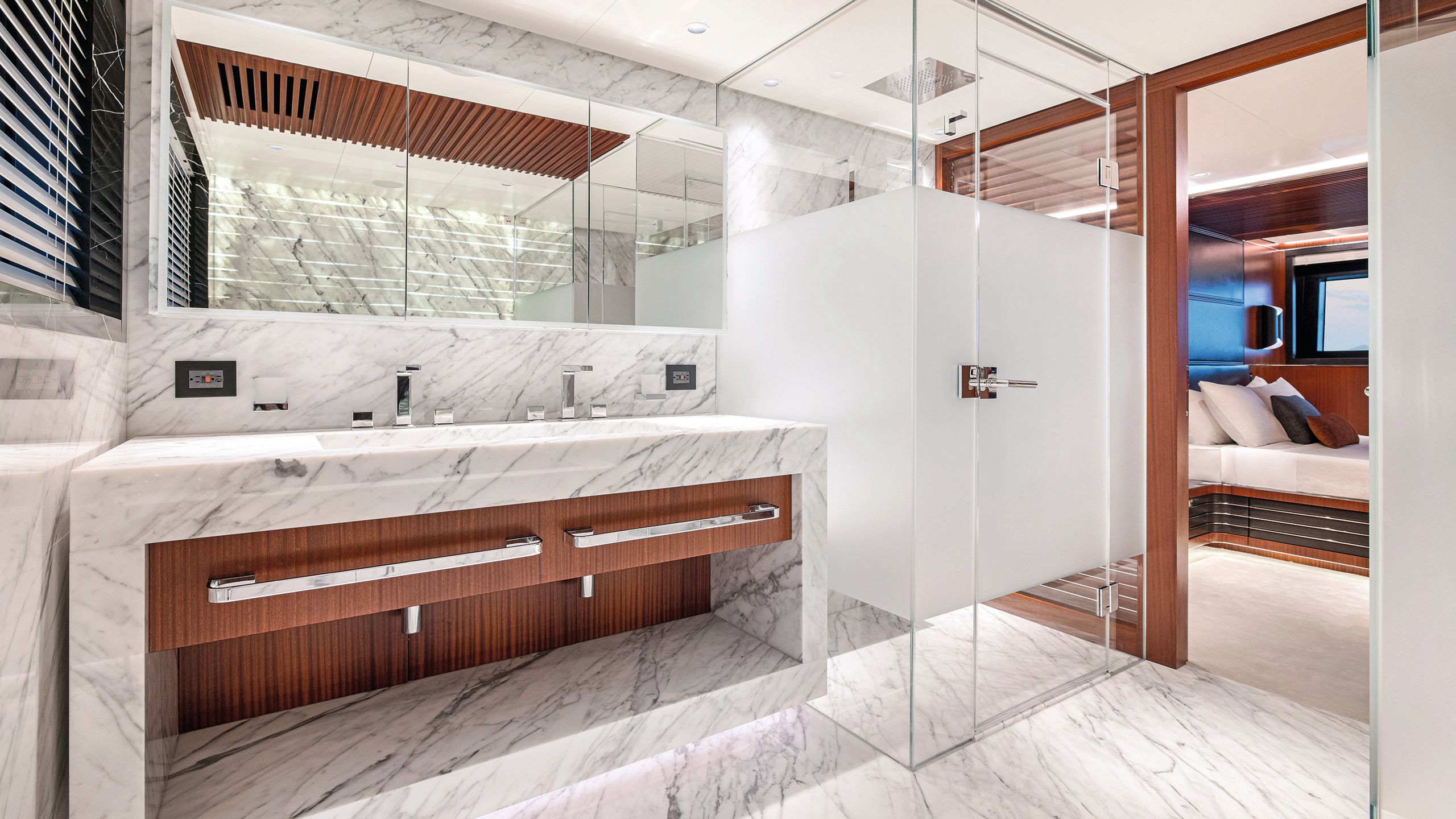
DOLF VERMEULEN
DOLF VERMEULEN
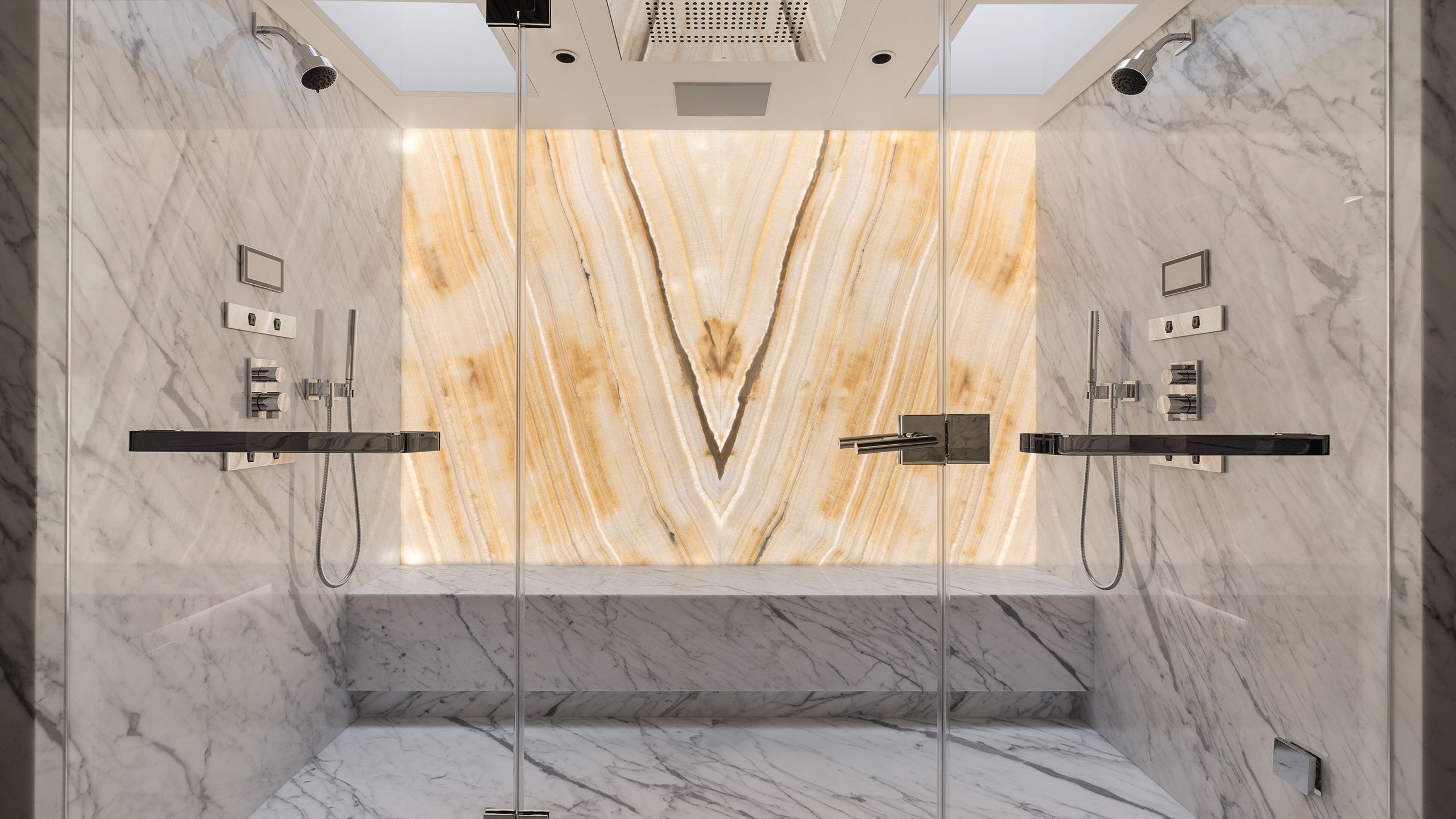
DOLF VERMEULEN
DOLF VERMEULEN
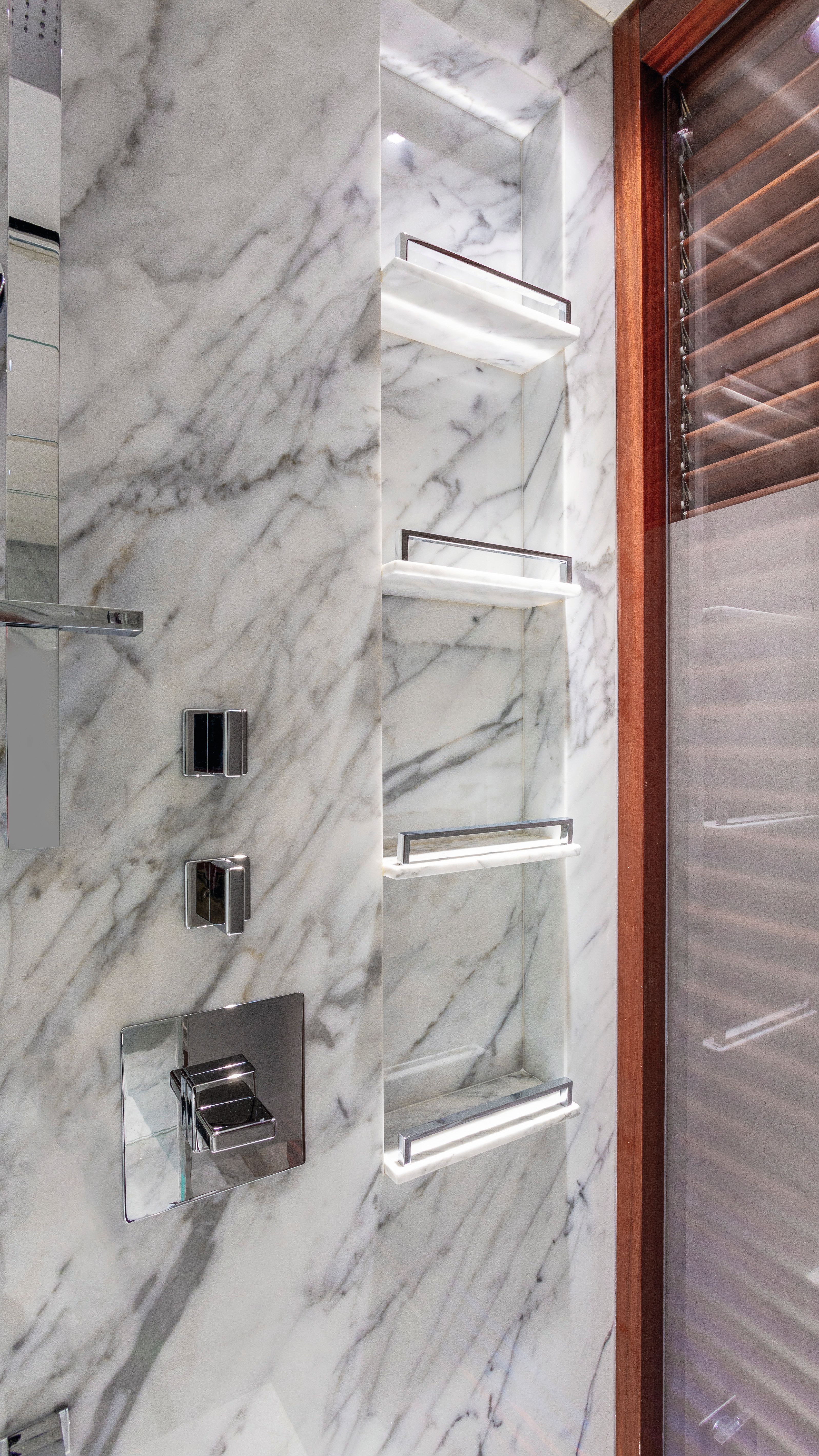
STEPHEN CRIDLAND
STEPHEN CRIDLAND
Genesis did all the crew area’s interior. “I put a lot of time and effort into the crew’s quarters. I think that’s important too because, in my experience, the crew is the difference between a great experience or just a normal one,” the owner says.
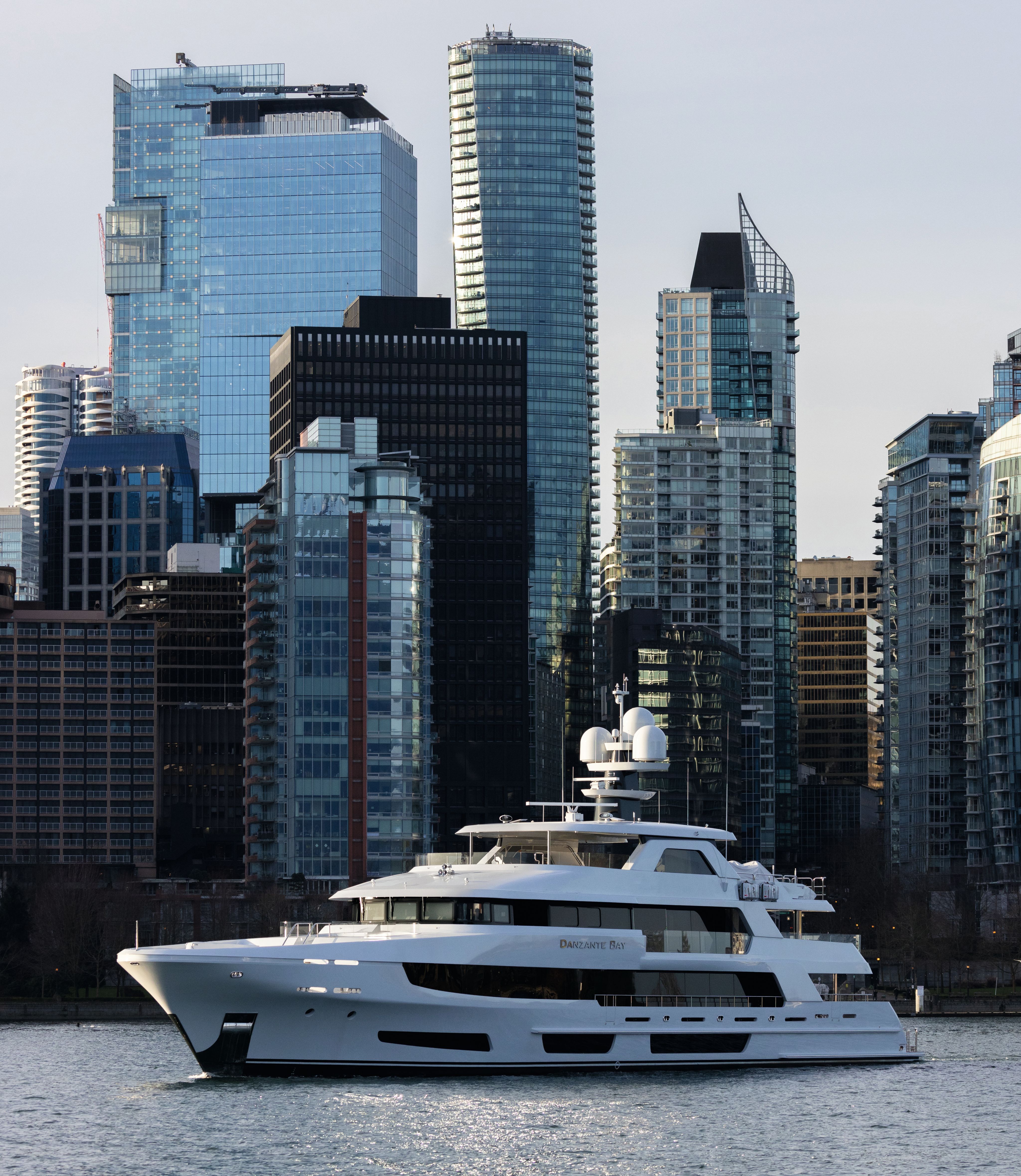
DOLF VERMEULENBuilt in Vancouver, British Columbia, Danzante Bay now claims the title as the largest yacht built in Canada
DOLF VERMEULENBuilt in Vancouver, British Columbia, Danzante Bay now claims the title as the largest yacht built in Canada
He’s happy that the early sightings of the nearly finished yacht quieted those among his entourage who thought he’d strayed on the wild side by buying a hull from a yard that had ceased business and given the project to a yard without a significant track record in the superyacht segment.
“[Crescent] never gave up and I never gave up. And she really came out great,” he says.
First published in the August 2024 issue of BOAT International US Edition. Get this magazine sent straight to your door, or subscribe and never miss an issue.
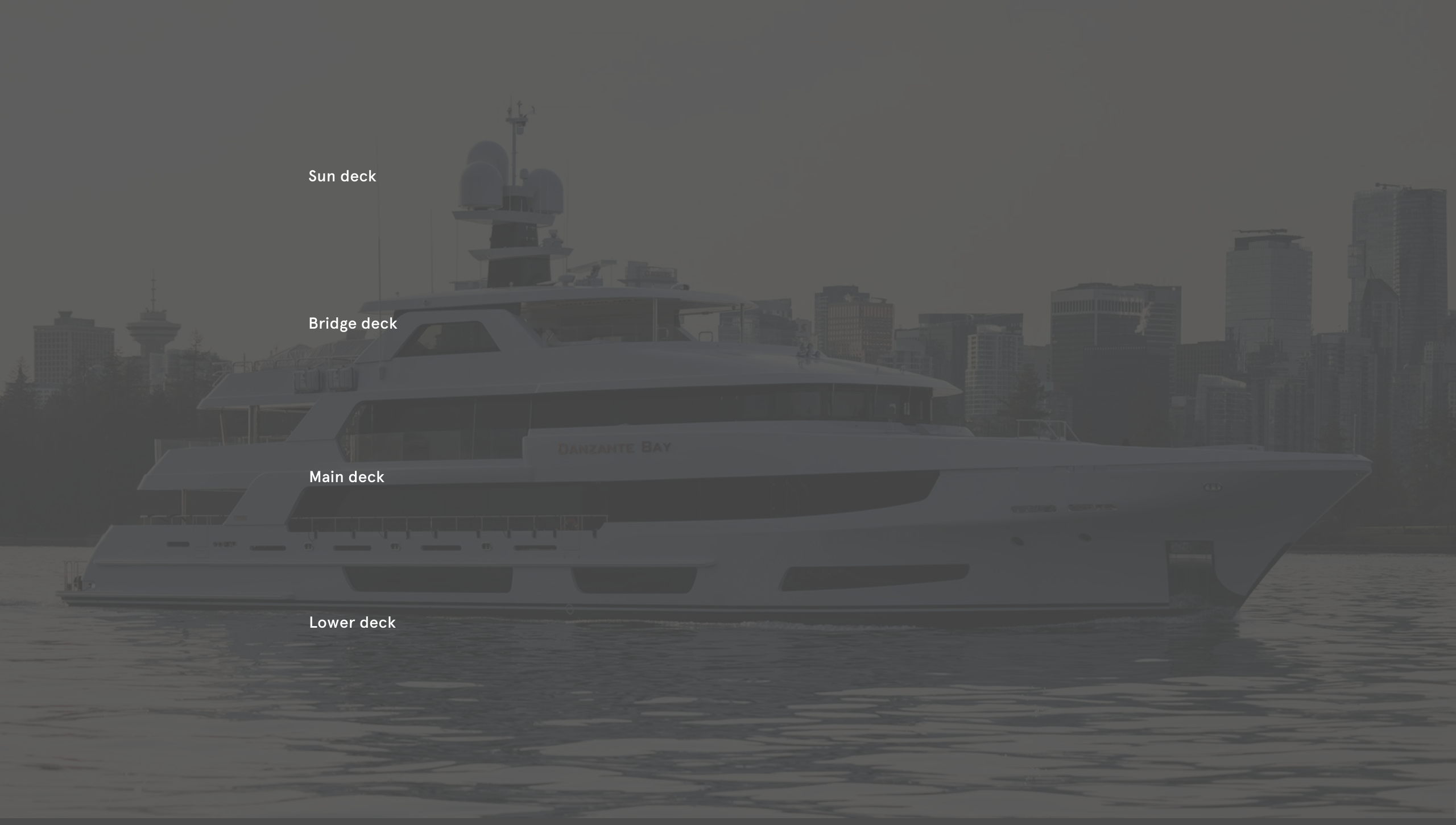
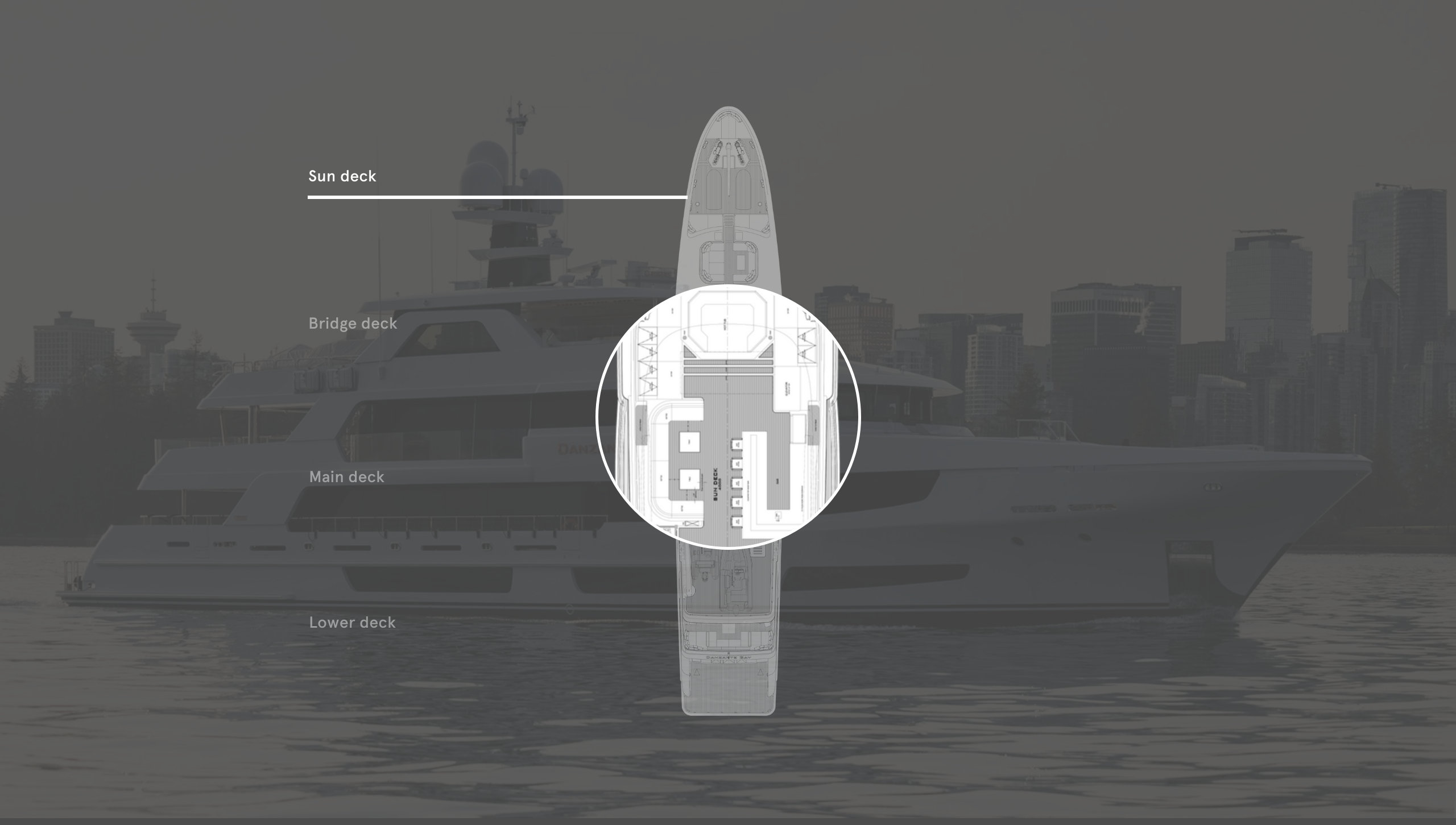
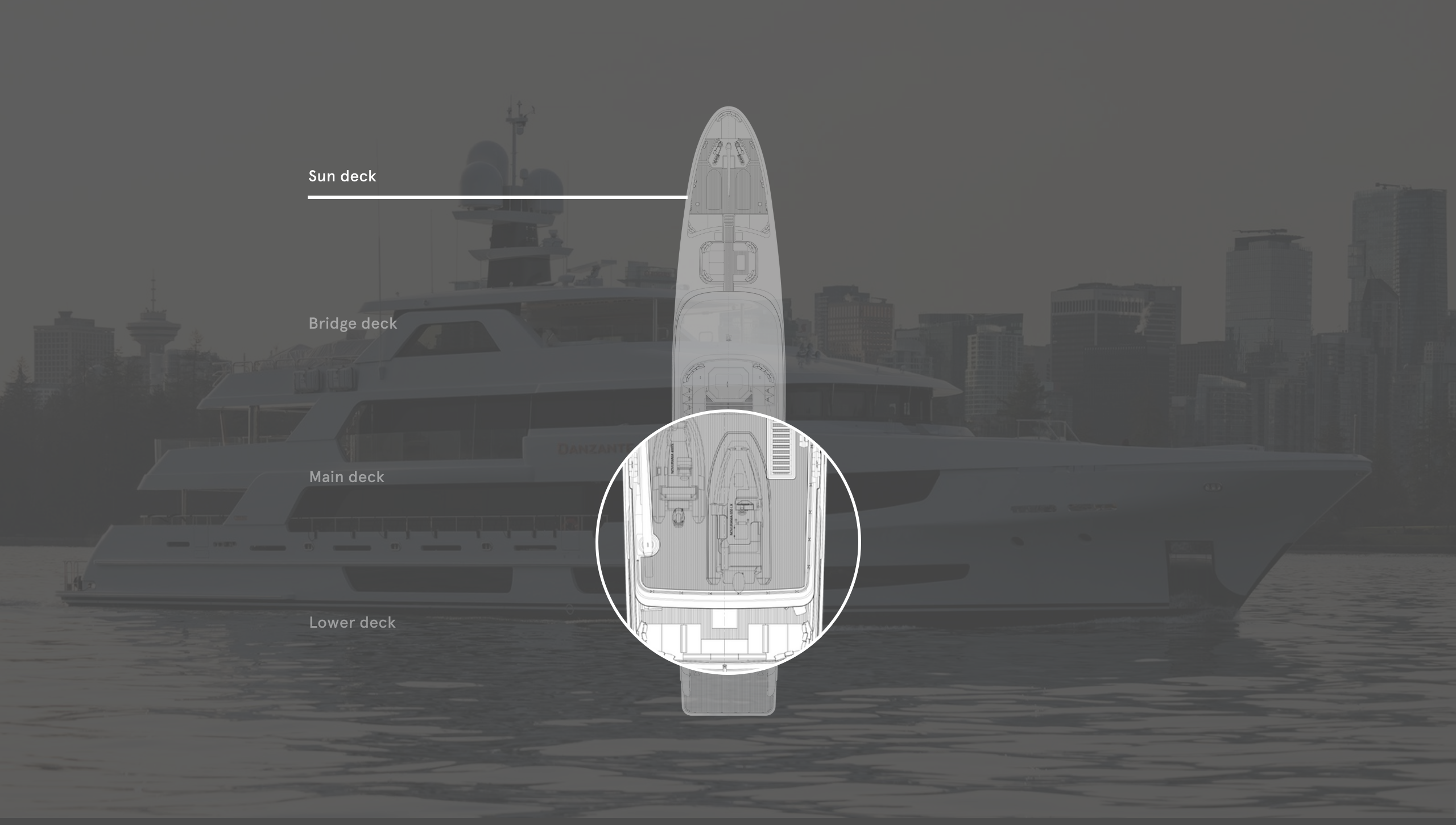
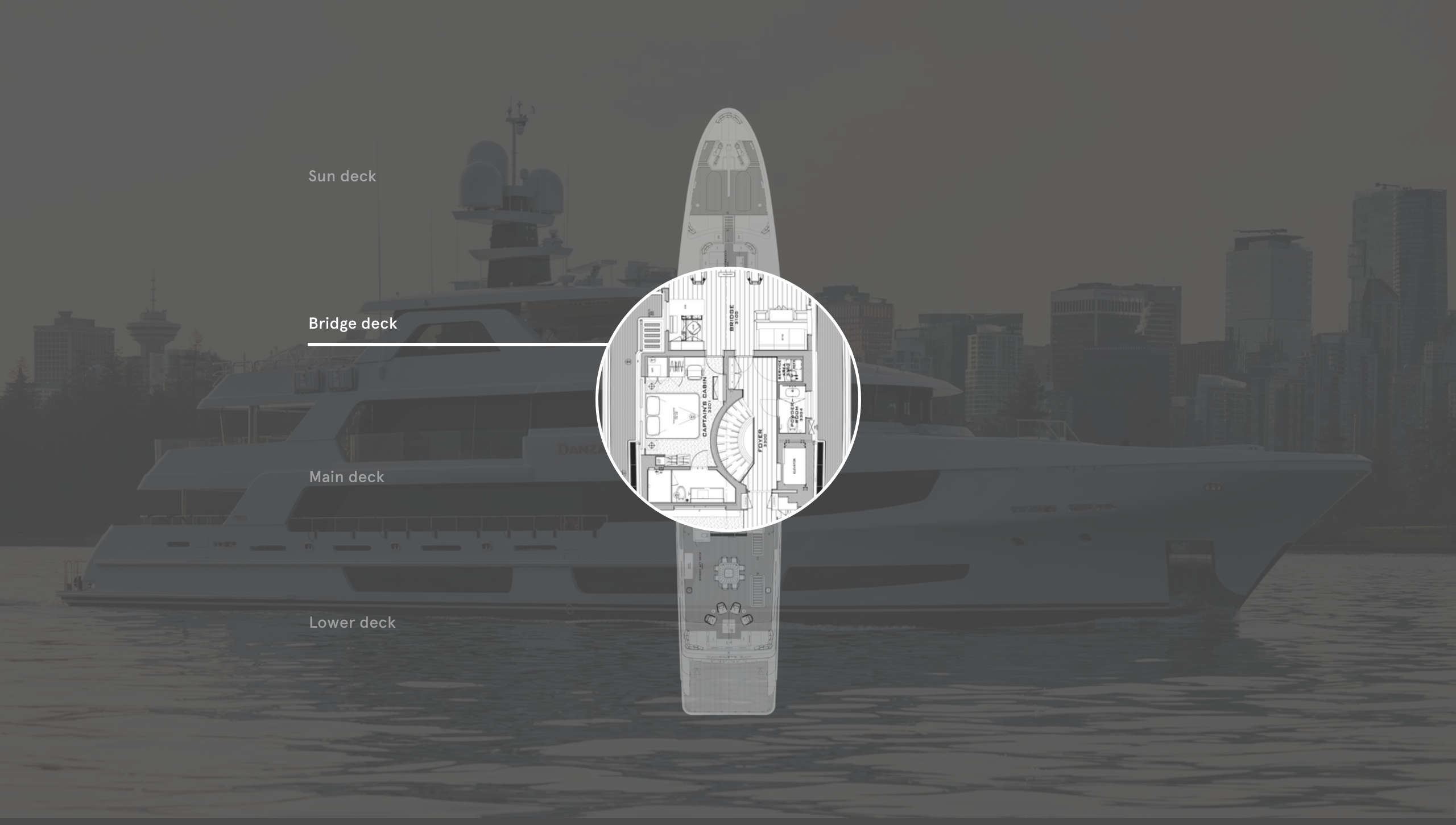
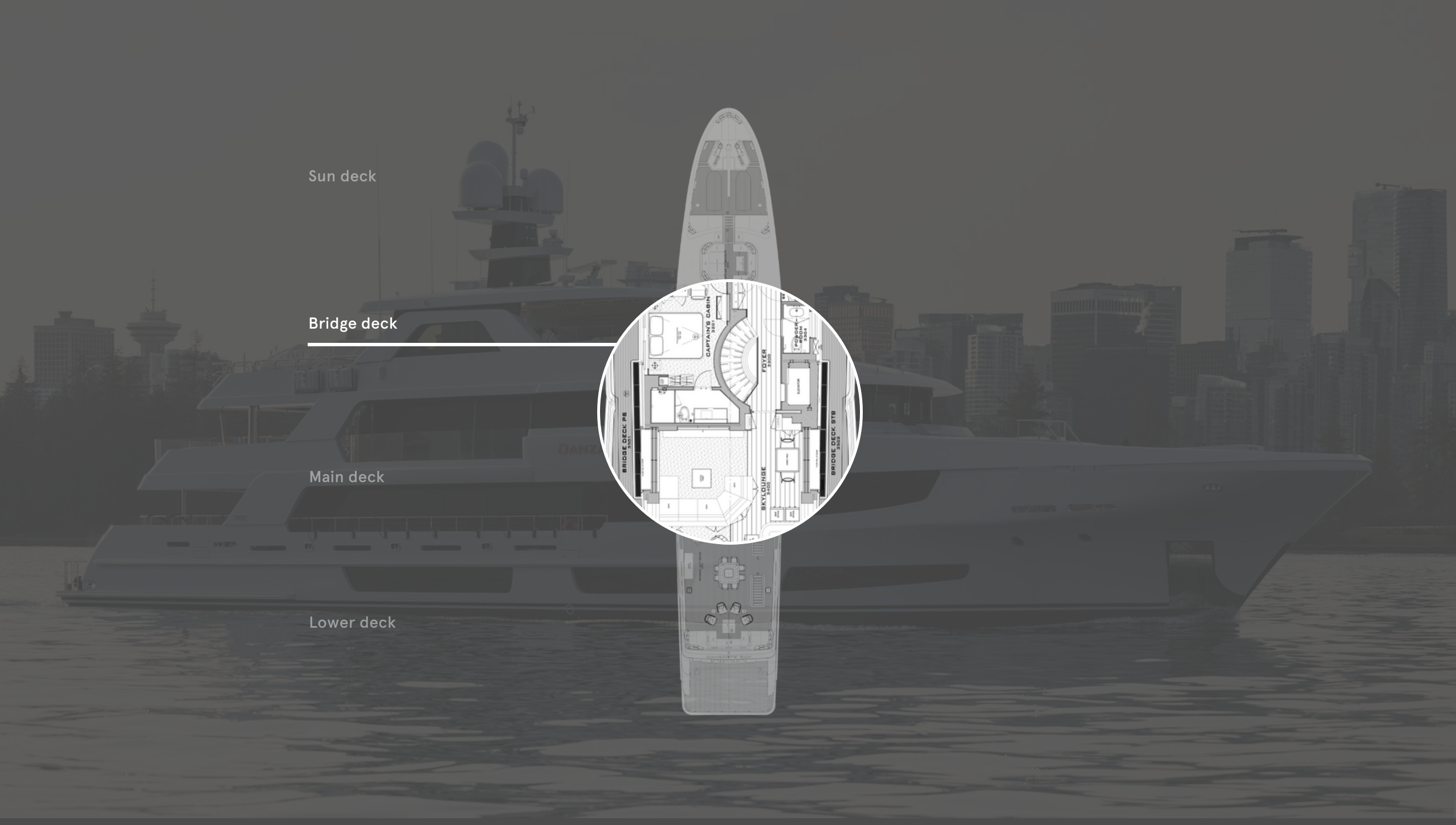
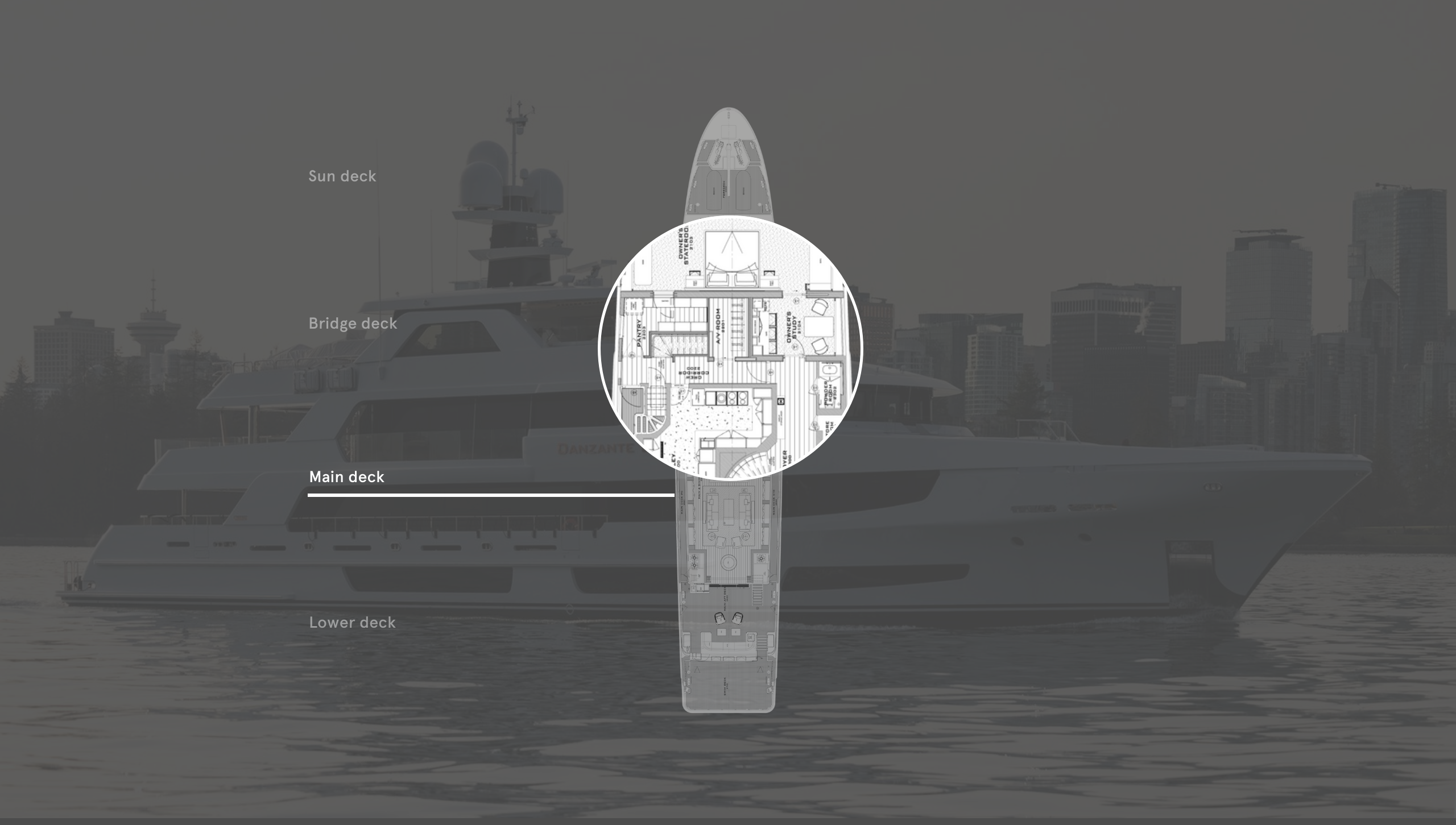
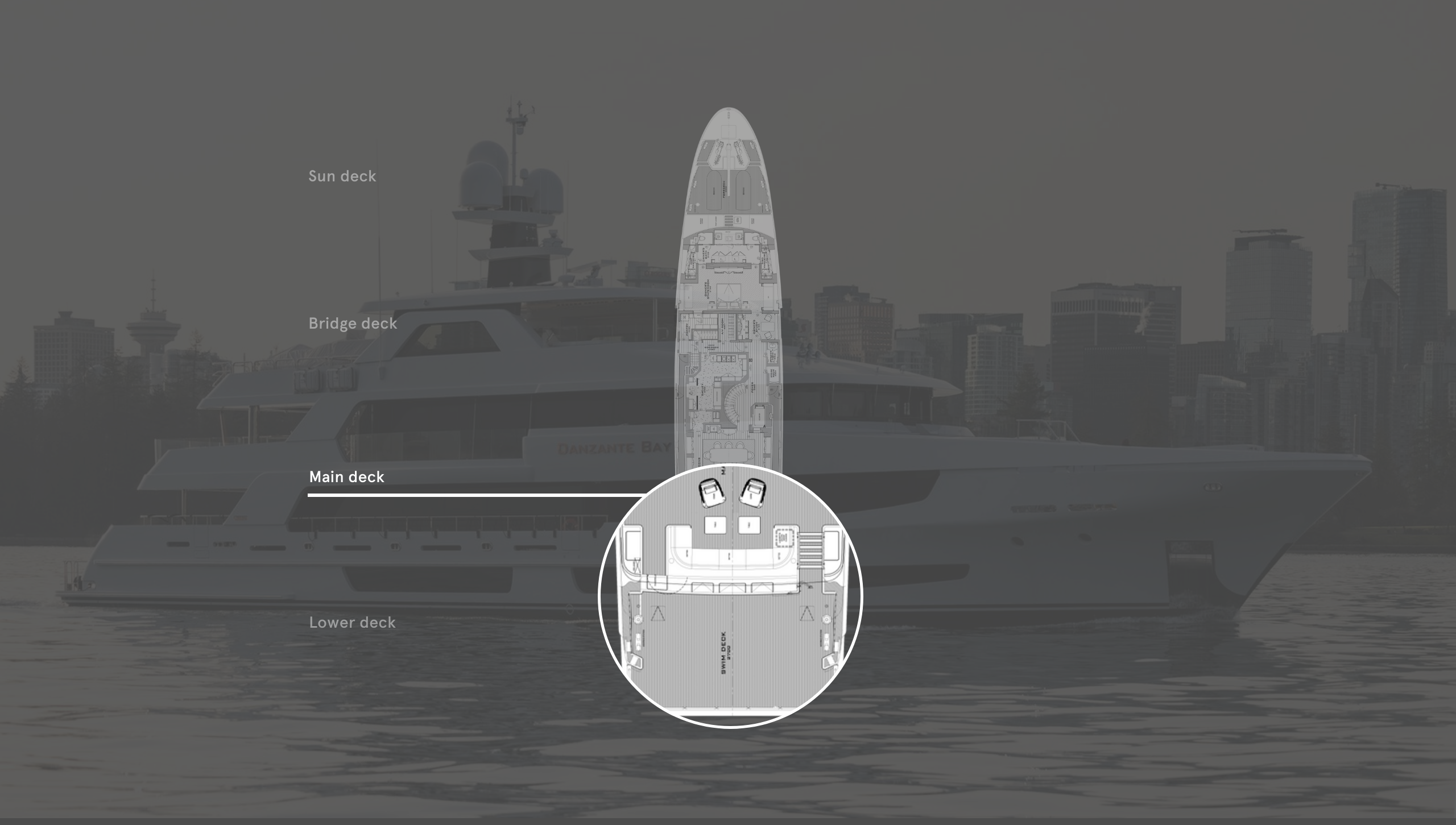
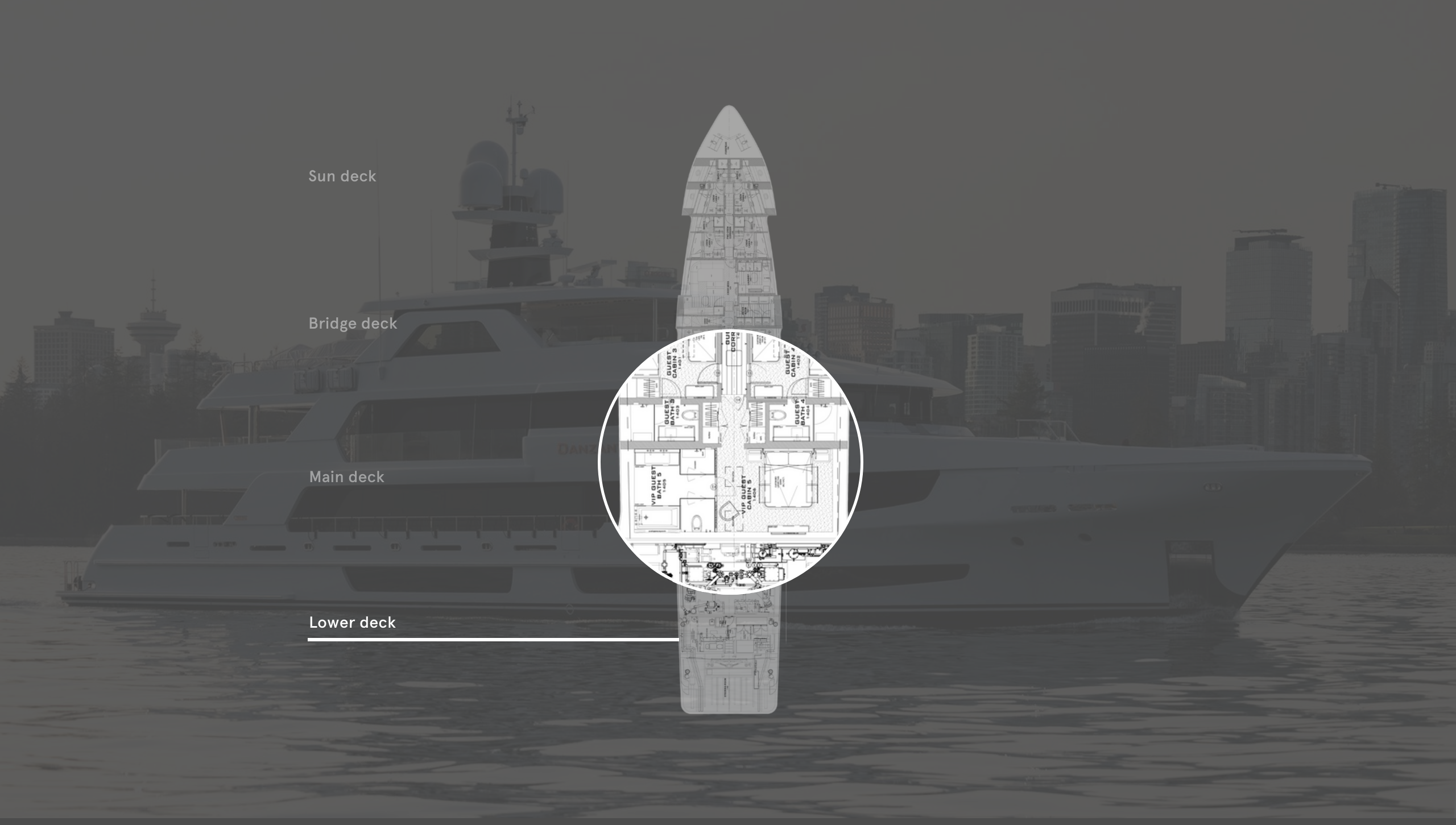
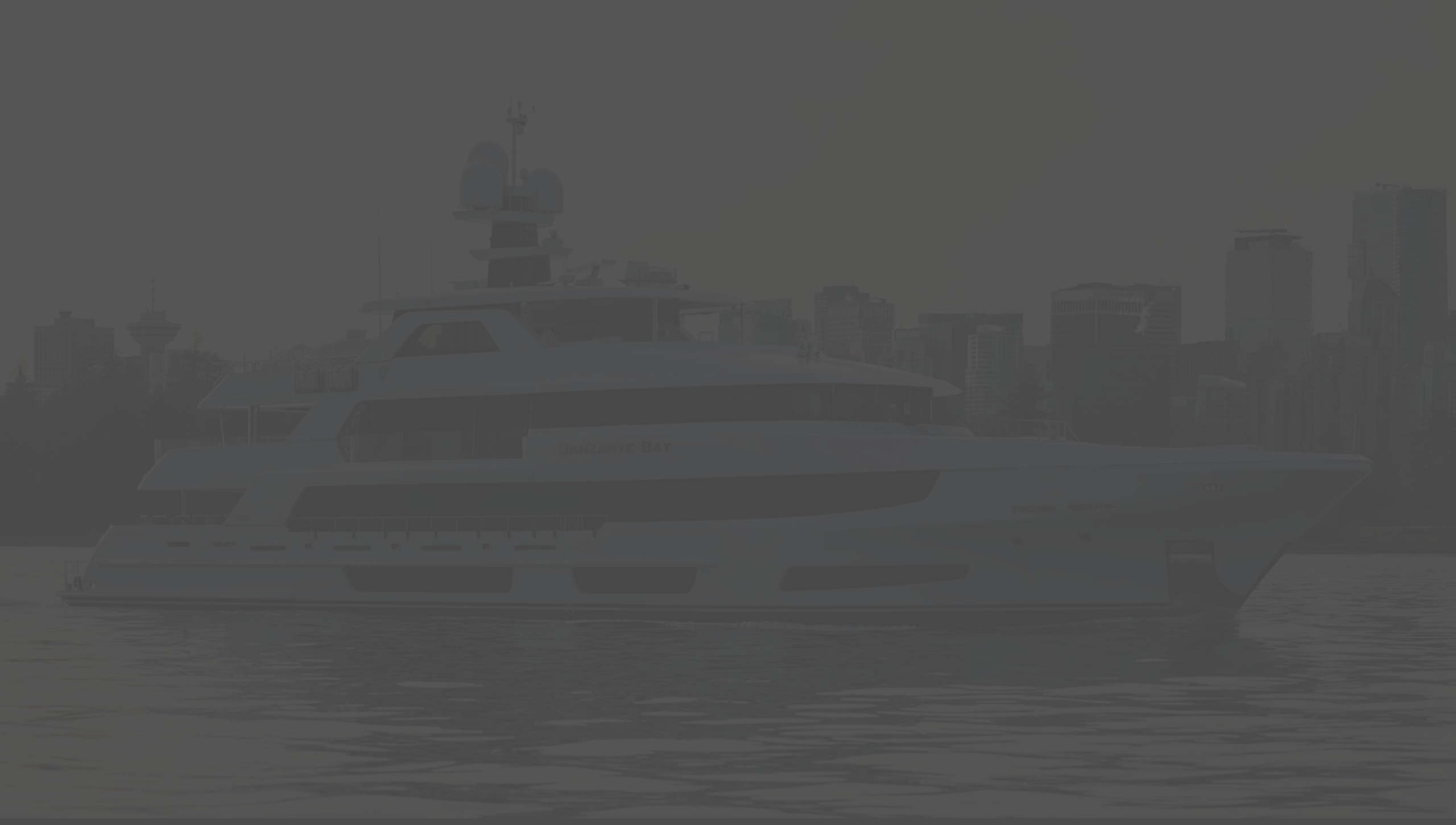
An elevator goes to all decks
With a Jacuzzi forward, the
sundeck has room for tender storage aft
The captain’s cabin is
comparable to a guest cabin in size and comfort
Floor to ceiling windows open up the sky lounge to great views
The owner has a lovely office with a watch winder/display
The owner wanted the biggest swim platform possible for inflatable furniture
A full-beam VIP cabin could be a second owner’s cabin
LOA 50m | Gross tonnage |
LWL 43.7m | Engines |
Beam 9.4m | Generators |
Draft 2.4m | Speed (max/cruise) |
Range at 10 knots | Owners/guests 12 |
Fuel capacity | Crew 9 |
Freshwater capacity | Construction |
Tenders | Naval architecture |
Exterior design | Builder/year |
Interior design | +1 604 301 3900 |

